100+ Best Cold Email Subject Lines That Get Results
This means your subject line isn't just the first impression—it's the deciding factor between your email being seen or being ignored.
But what type of subject lines work and what won’t work?
That’s what we’re going to learn. In this article, I’ve brought 100+ best cold email subject lines that actually convert.
We’ll learn:
- 5 key principles to create perfect cold email subject lines
- 4 proven formulas to craft killer subject lines
- 100+ best cold email subject lines
But before that, let’s first understand what exactly is a subject line and why is it important?
What is an email subject line?
An email subject line (aka email headline) is the text you see before opening an email. It tells you what the email is about and helps you decide whether to open it or not.
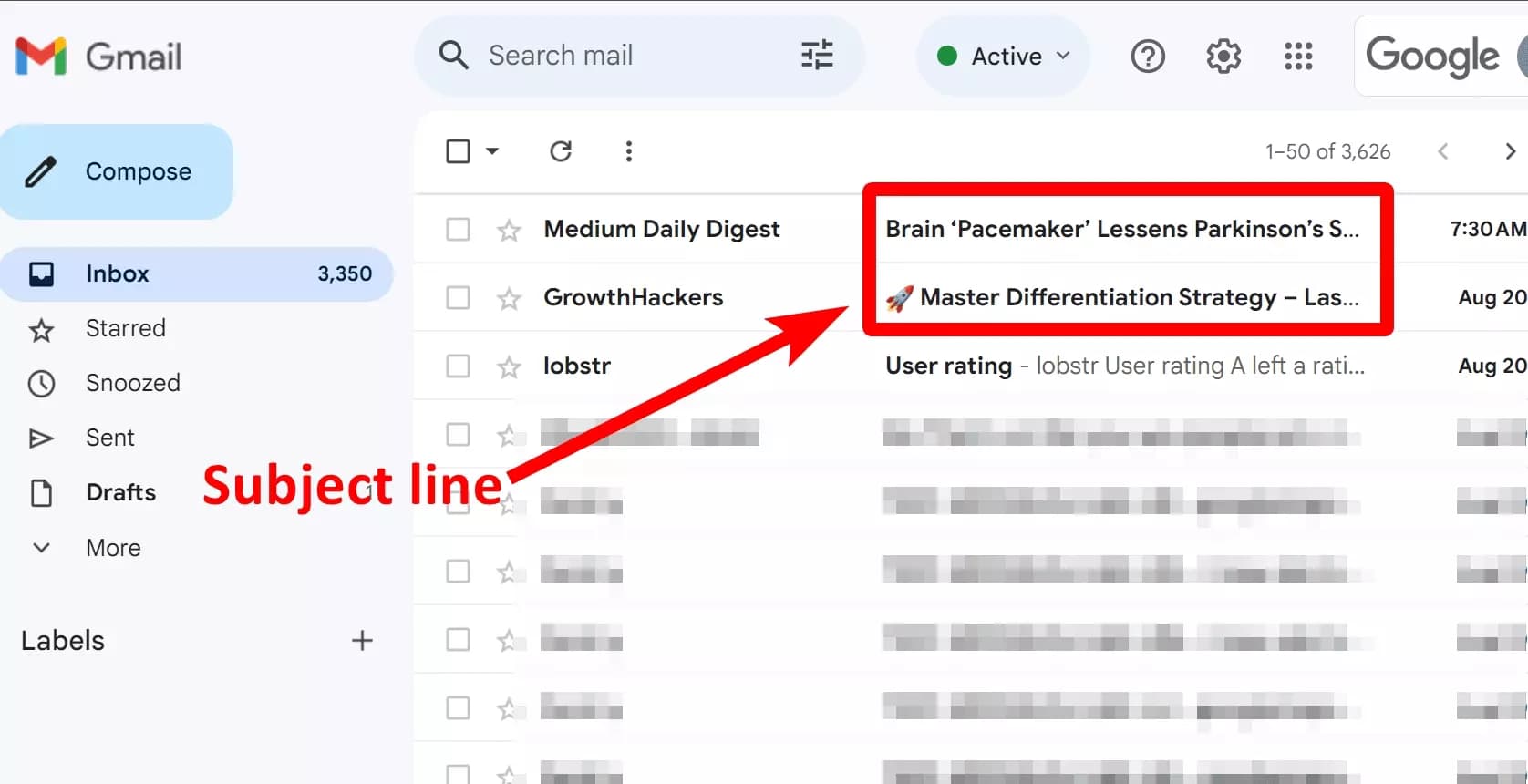
But why is it so important?
Why do subject lines matter in cold emails?
A good subject line grabs attention and makes the reader interested in reading more.
It is your first impression and determines if your cold email will be opened or ignored.
If it's interesting, recipients open the email. If it’s boring or unclear, they might skip it or delete it without reading.
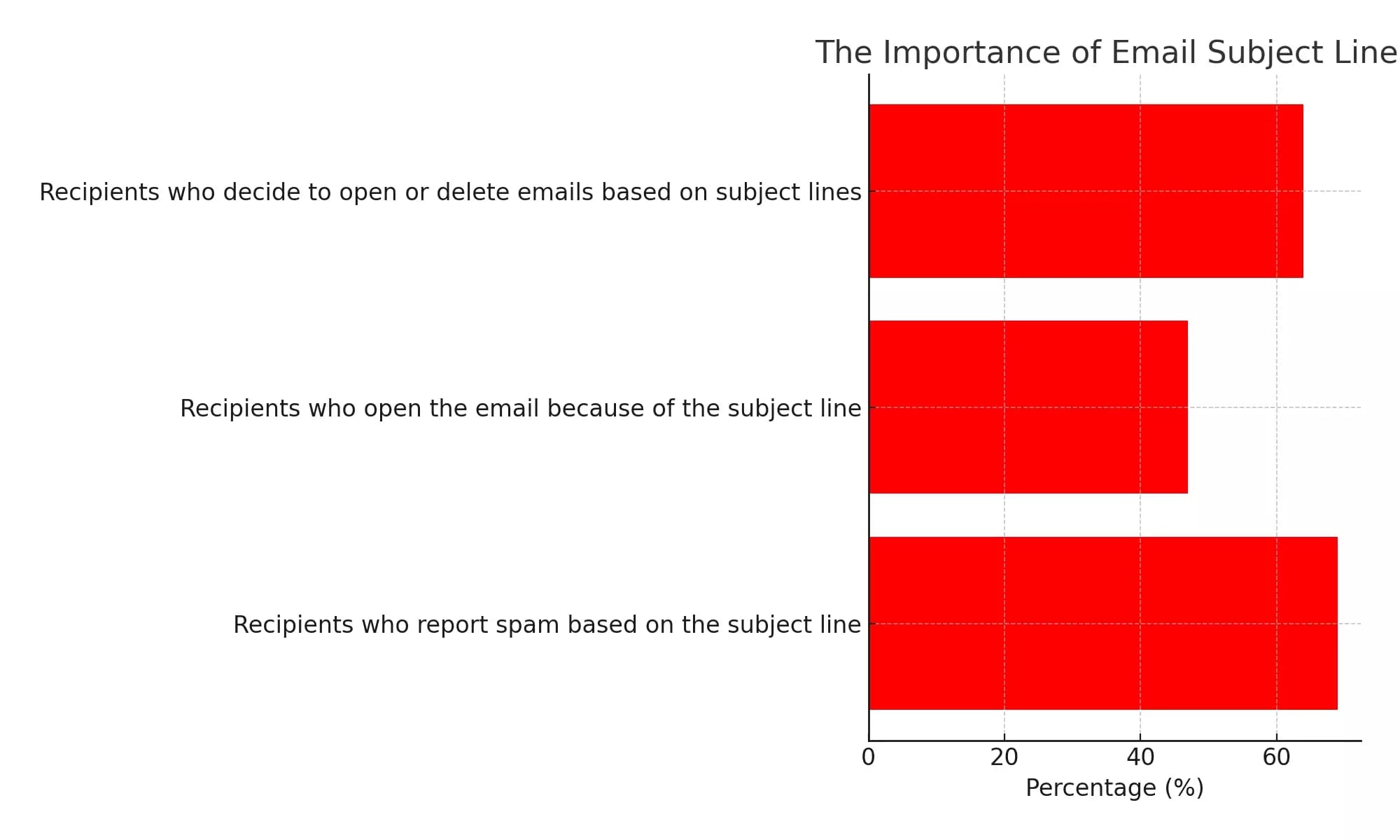
It sets the mood and makes people curious to read more.
A good subject line makes the reader feel interested and eager to see what you have to say.
OK! I get it. It’s important for a successful cold email campaign.
But how do I write a perfect subject line that increases my email open rate?
How to create cold email subject lines that convert?
There’s no rocket science or secret sauce. You can create subject lines that drive engagement using these 5 key principles.
5 key principles to write great subject lines
1. Personalization
Personalized subject lines make your emails more appealing.
When you include the recipient's name or something specific to them in the subject line, they feel the email is meant for them.
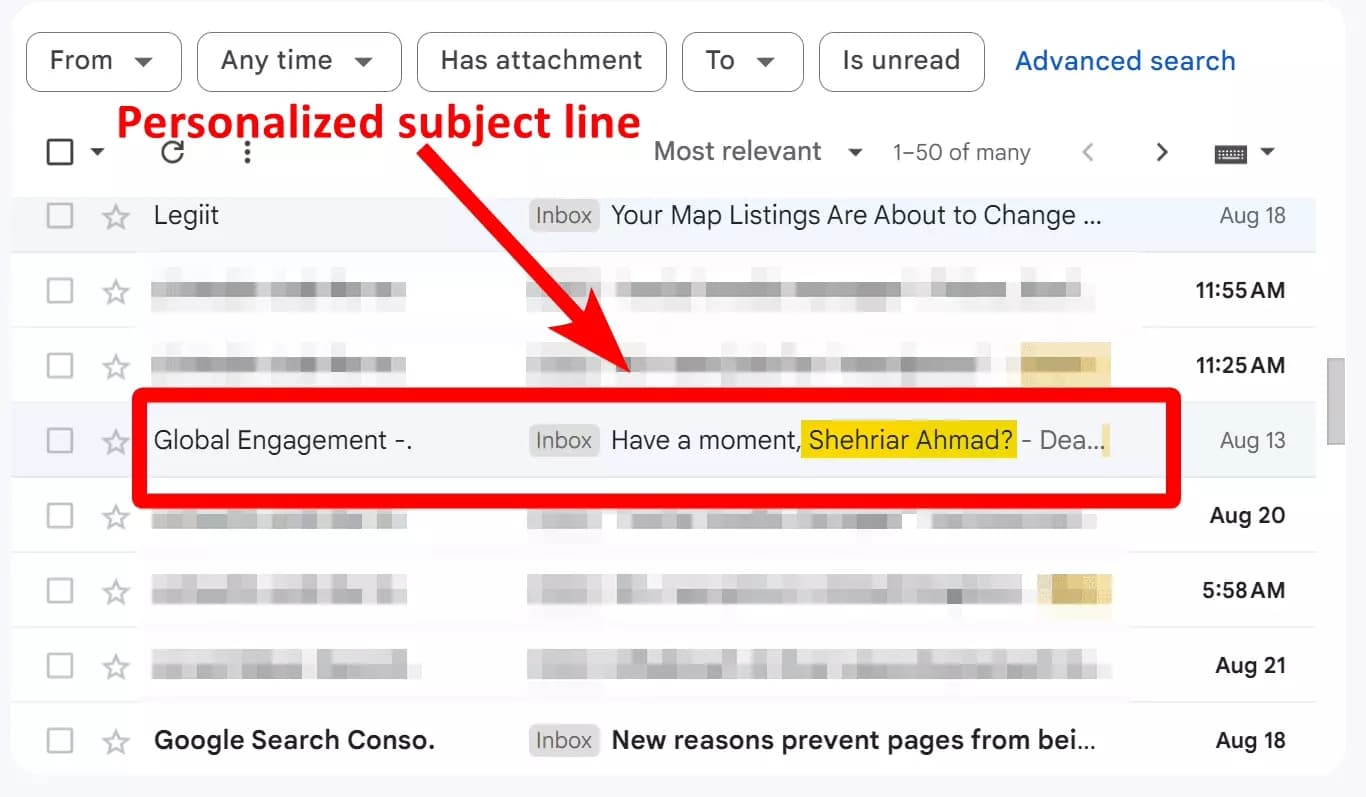
But how to personalize?
- Use the recipient’s first name in the subject line
- Reference their company name or industry
- Mention a recent accomplishment or milestone
- Tailor the subject line to their specific pain point or need
- Highlight a mutual connection or shared interest
2. Clarity
Keep your subject lines clear and to the point. People are busy and won’t spend time figuring out what your email is about.
A clear subject line quickly tells them what to expect, making them more likely to open it.
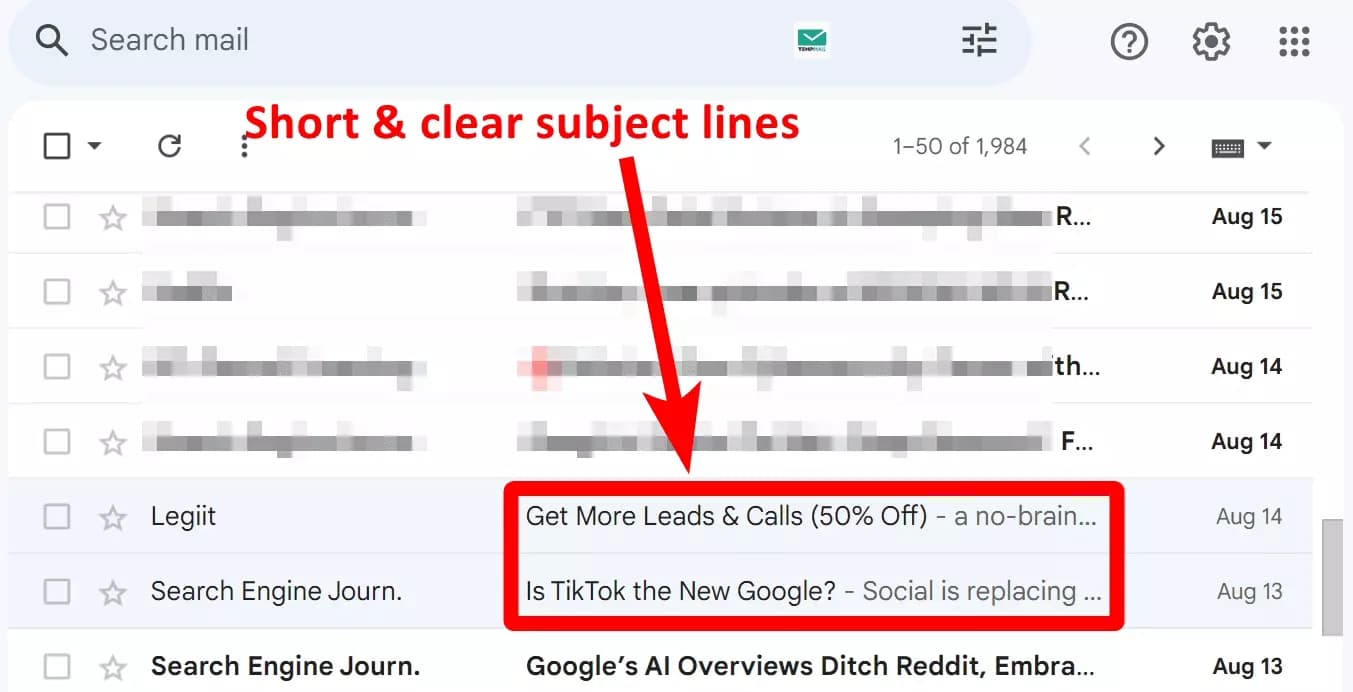
Shorter subject lines are easier to read and understand at a glance. The simpler and more direct your subject line, the better your chances of getting noticed.
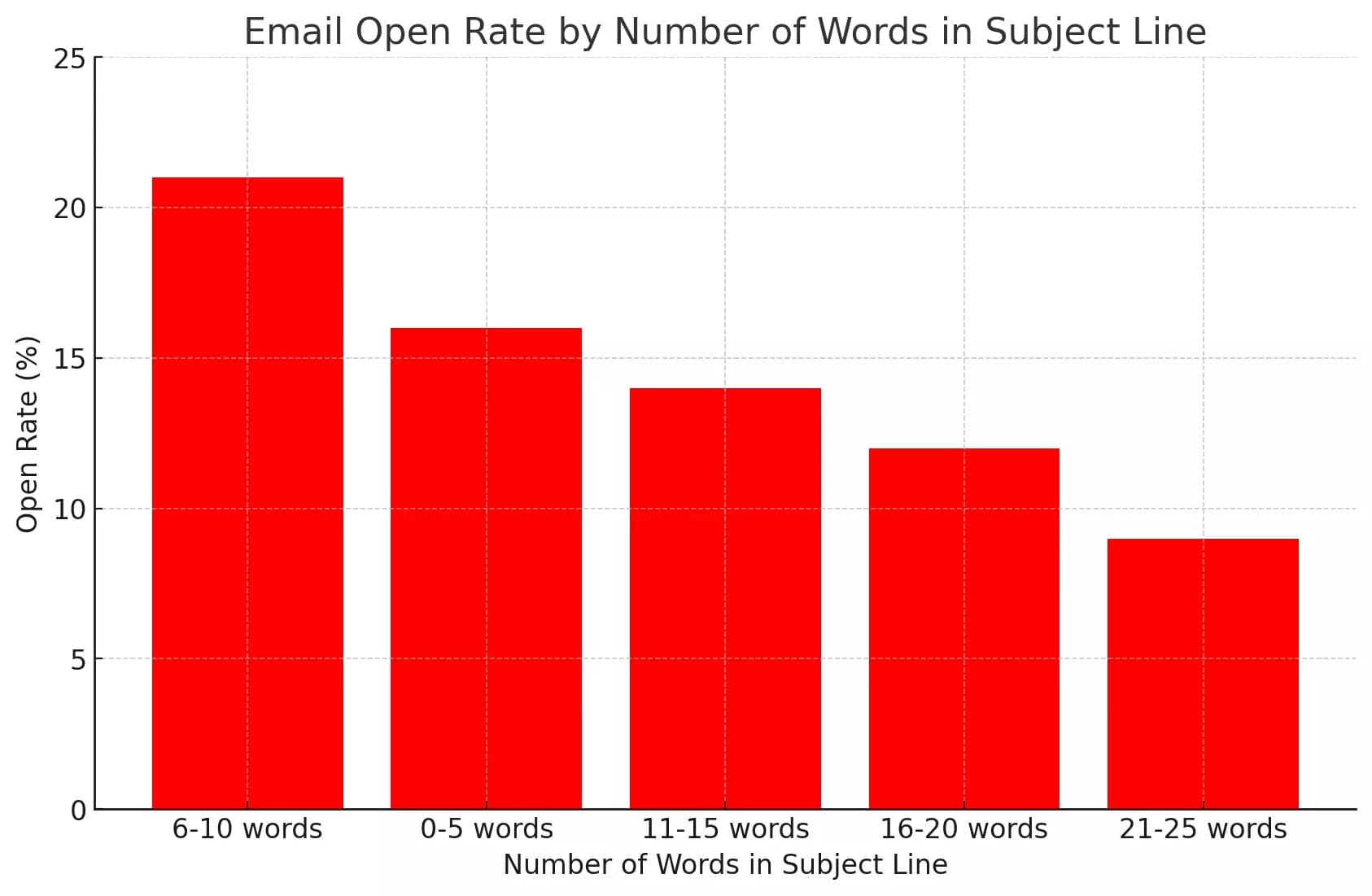
But how to keep it clear and concise?
- Focus on the core message of your email
- Keep the subject line under 40 characters
- Use simple, everyday language
- Avoid unnecessary adjectives or filler words
- Be specific and direct about what the email contains
3. Curiosity
When you create a sense of intrigue, people naturally want to know more.
A subject line that hints at something interesting or valuable inside the email can tempt recipients to click just to satisfy their curiosity.
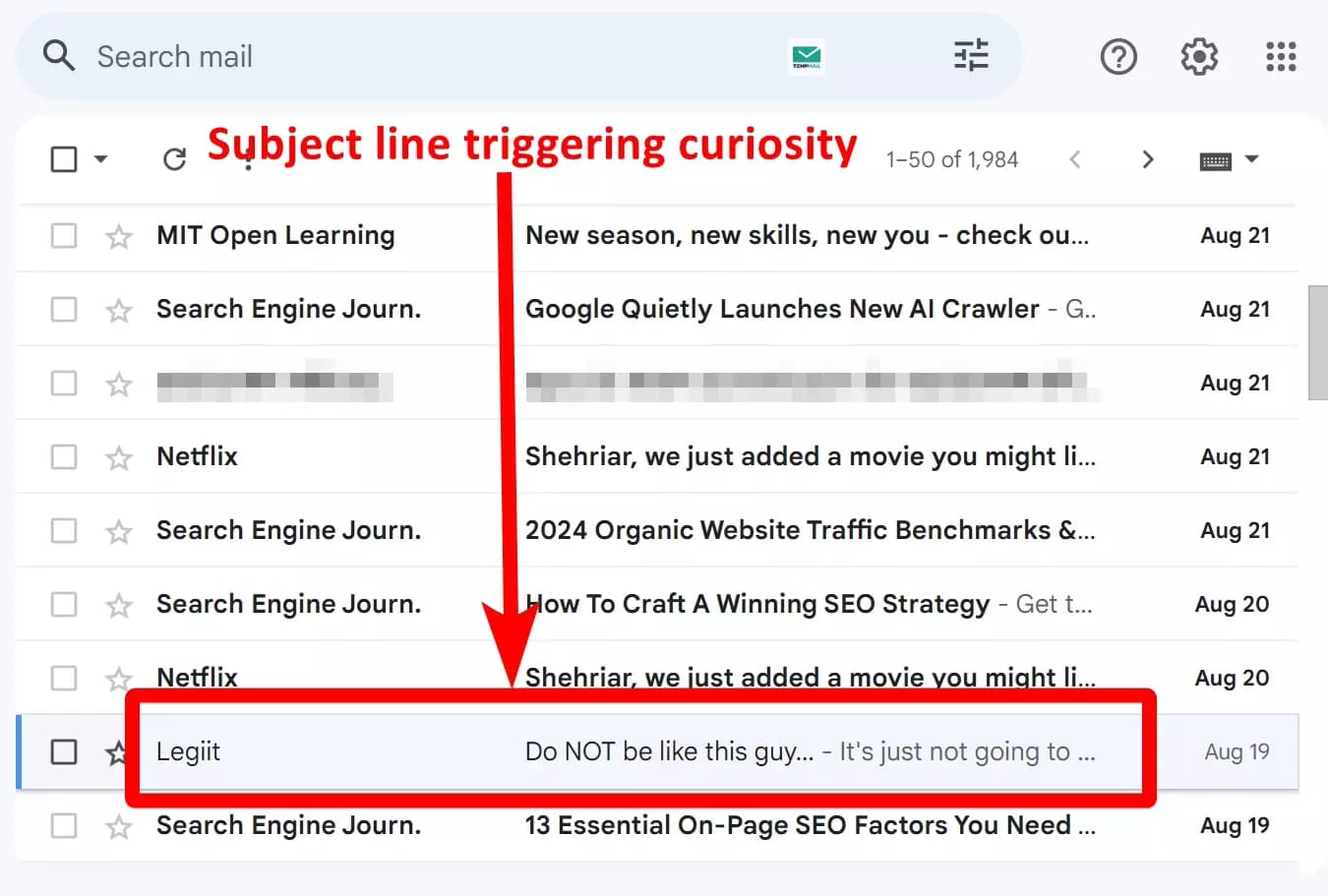
But how can I spark curiosity?
- Pose an intriguing question
- Use a teaser that hints at valuable content
- Include a surprising or unexpected statement
- Use phrases like What you didn’t know about… or Have you considered…?
- Don’t give away full details
4. Value Proposition
Your subject line should clearly communicate the benefit of opening the email. When recipients see a direct value, they’re more likely to click.
Whether it’s a solution to a problem, a special offer, or useful information, make sure the value is obvious.
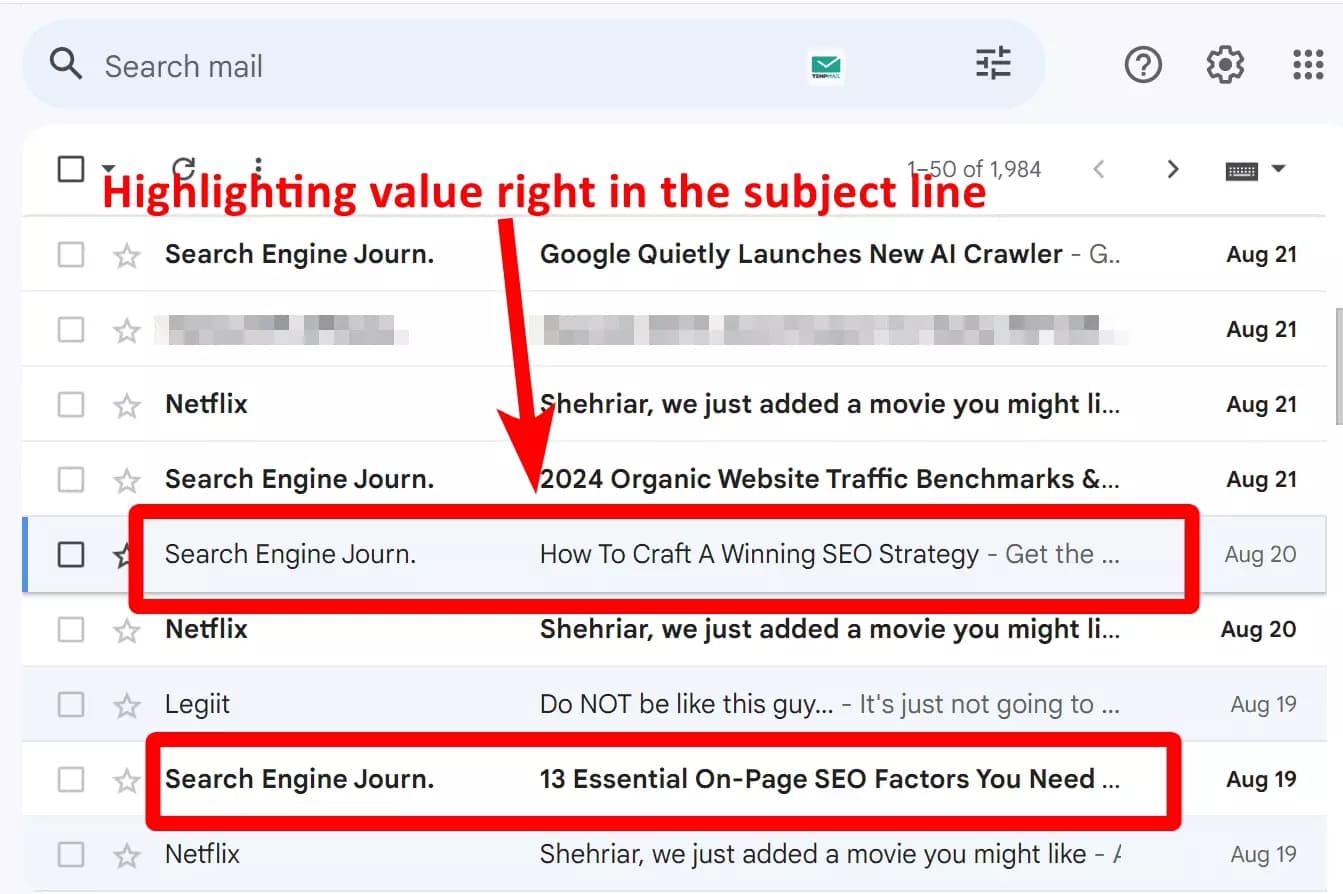
This shows just how effective it can be to highlight the value you’re offering right from the start.
But how do highlight value through the subject line?
- Clearly state the benefit or value offered
- Use action verbs like Get, Save or Learn
- Be specific about the result or outcome
- Highlight any special offers or discounts
- Include numbers or percentages to quantify the value
5. Urgency
When people feel they might miss out on something valuable, they’re more likely to open the email right away.
So creating a sense of urgency in your subject line can prompt immediate action from the recipient.
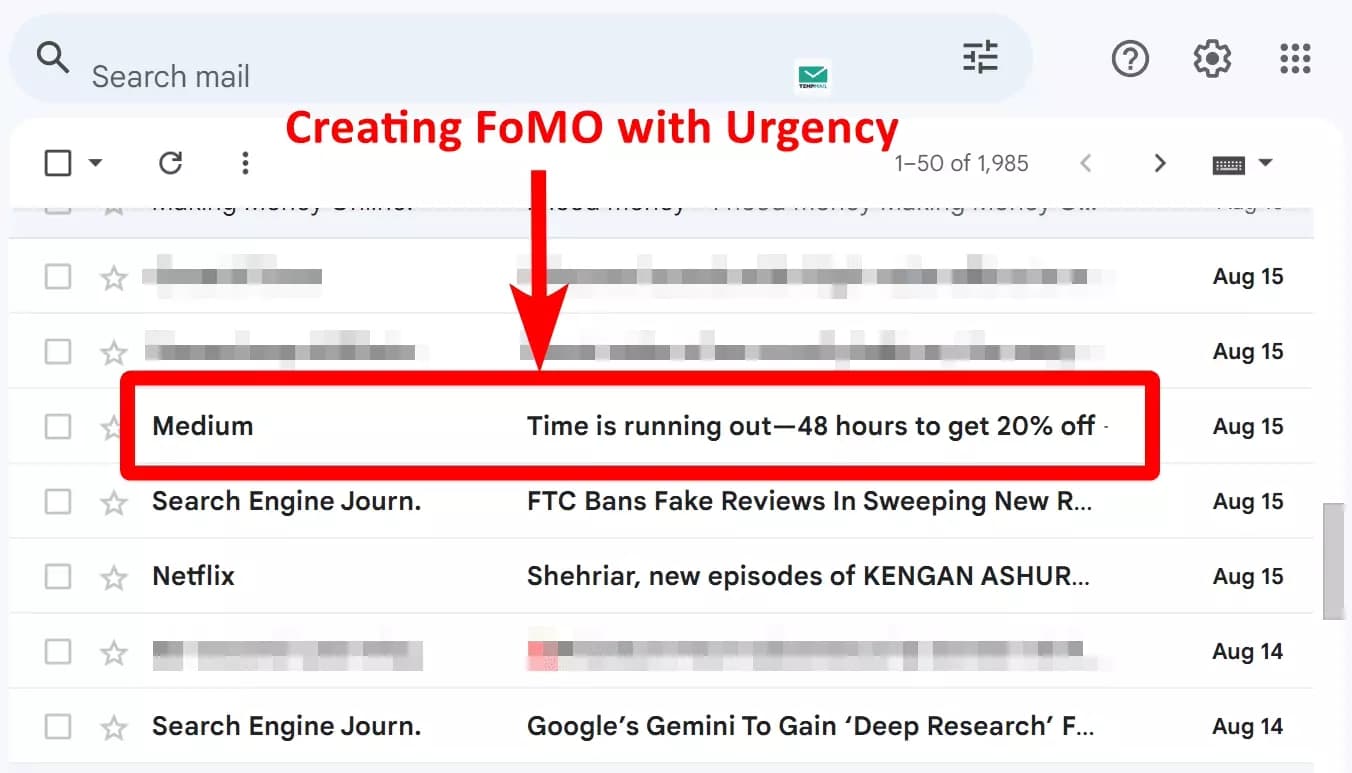
How can I create urgency?
- Use phrases like Limited time, Today only or Ends soon
- Emphasize scarcity with words like Only a few left or While supplies last
- Set a deadline in the subject line e.g., Offer expires at midnight
- Create a sense of immediacy with Don’t miss out or Act now
- Mention a countdown or a ticking clock e.g., 24 hours left
But it’s still confusing. ☹️
How will I learn to blend these tips to create a perfect subject line?
Valid argument! 💯
Let’s look at some copywriting formulas you can use while creating the best cold subject lines.
4 copywriting formulas to write winning subject lines
Copywriting formulas are tried-and-true frameworks that help you craft persuasive and engaging content.
They simplify the process of writing by providing a clear structure to follow.
You can use these 4 copywriting formulas to write effective cold email subject lines.
Let's see how and when to use them.
1. AIDA formula
AIDA stands for Attention, Interest, Desire, and Action. It’s my favorite copywriting framework especially when I have to write cold emails.
This framework basically guides the reader through a sequence that leads him from noticing your message to taking action.
You can use AIDA in subject lines when you need to make a strong impact quickly—especially in cold emails.
In a subject line, AIDA works by condensing the entire process of attention, interest, desire, and action into a single and concise phrase.
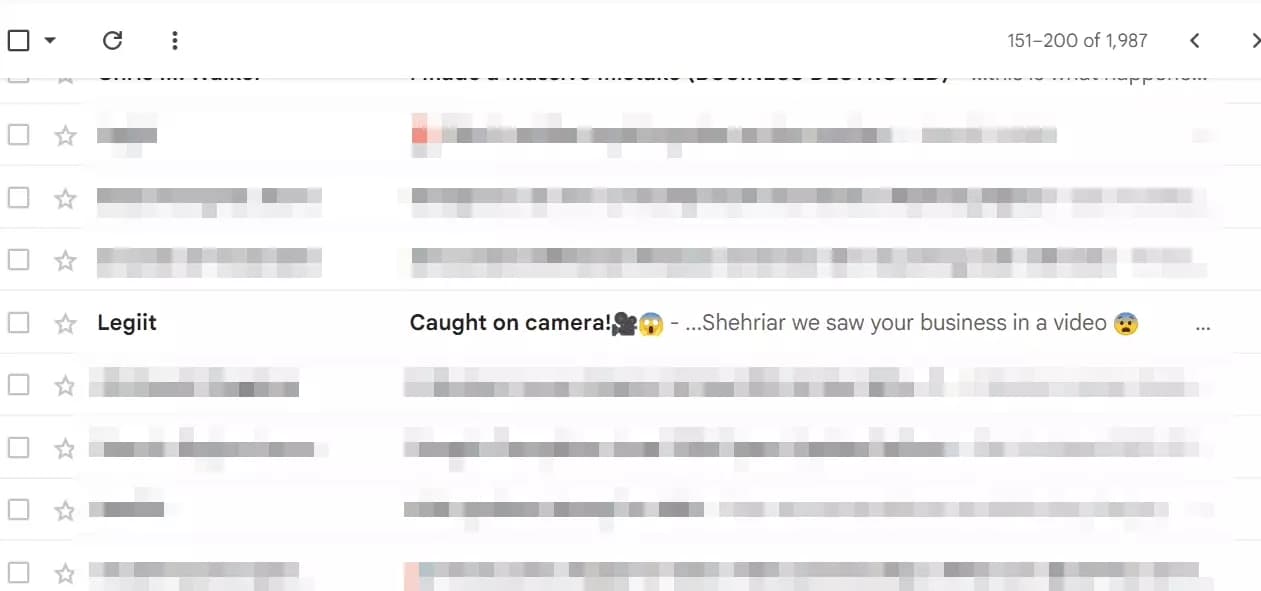
It’s particularly effective when you want to lead the reader directly from curiosity to a specific action.
- Attention: Start with a bold or urgent phrase
- Interest: Add a benefit or intriguing detail
- Desire: Highlight how they can achieve something valuable
- Action: Prompt them to open the email
Example: Boost Your Sales by 30% — Here’s Howf
2. PAS formula
PAS stands for Problem/Pain, Agitate, Solution. It’s my go-to framework when my copy is focused on value proposition.
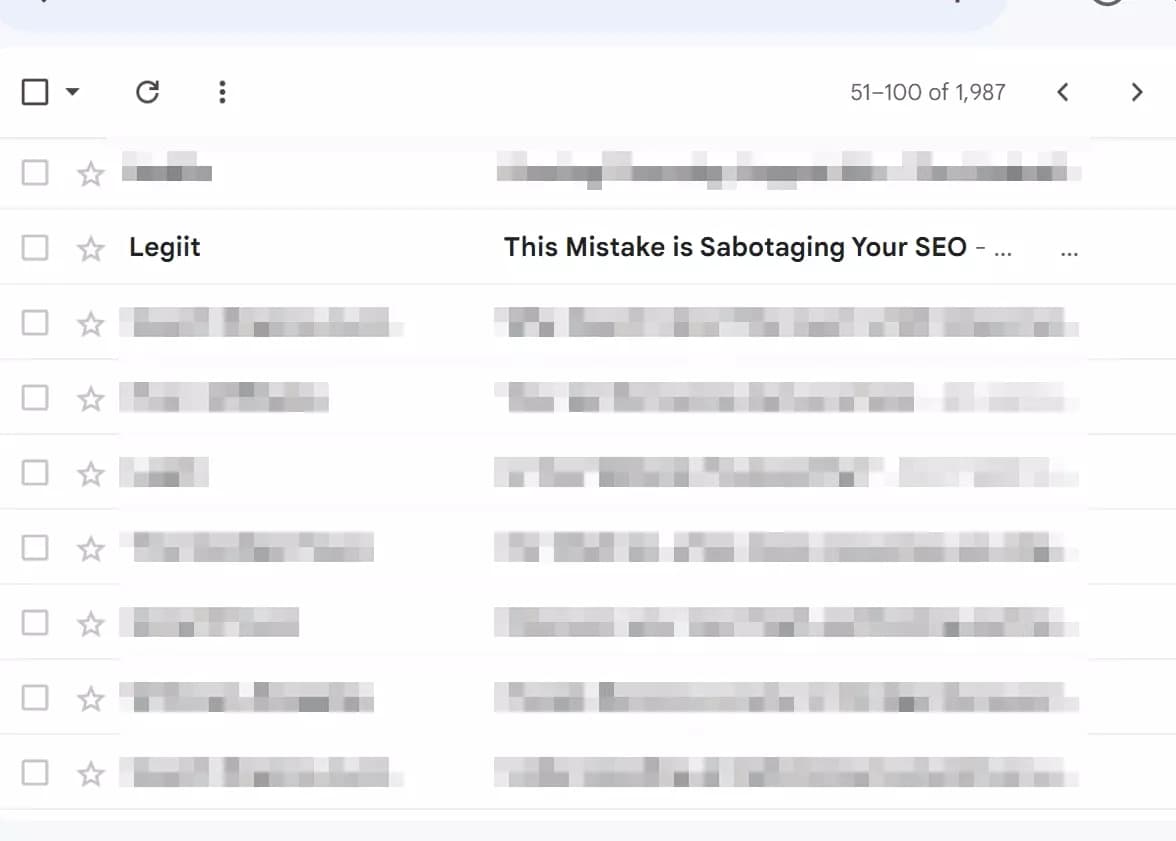
I normally use this framework in SEO copywriting but it’s equally effective in cold email outreach and crafting sales pitches.
Usually in this technique, the copy starts by identifying a problem, then intensifies the pain caused by that problem, and finally offers a solution.
In the context of subject lines, PAS helps you directly address the pain points of your target audience and present your email as the answer.
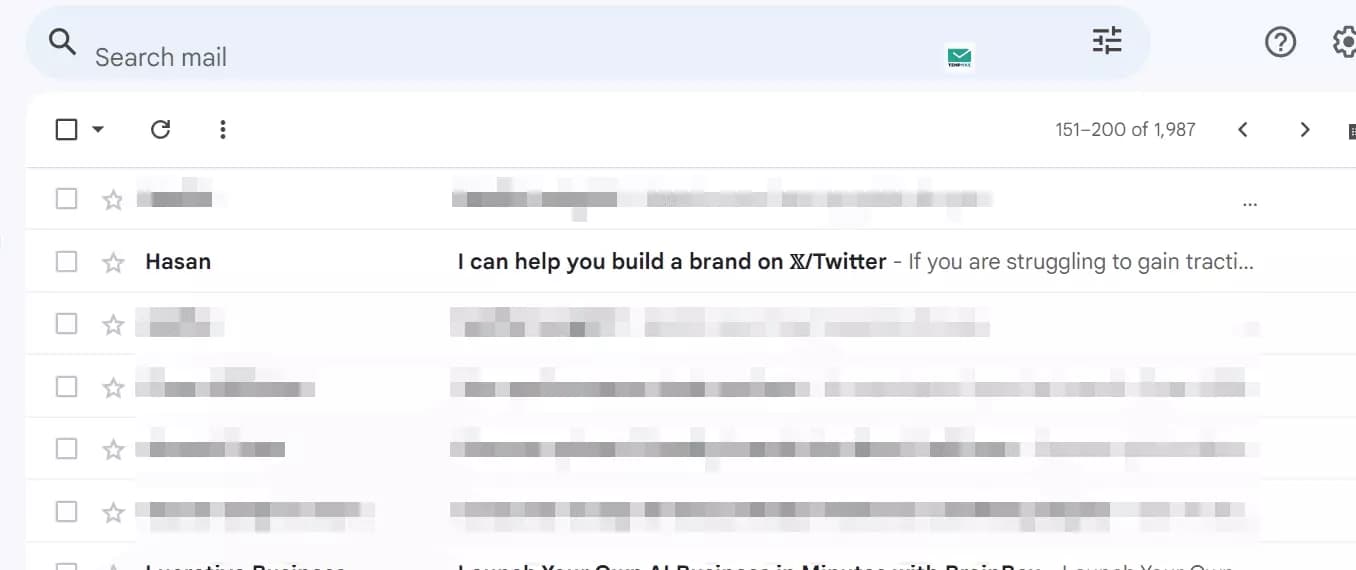
If your key focus is value proposition, this is the ideal framework for writing the best cold email subject lines and even the entire email copy.
How to implement PAS in subject lines?
- Problem: Start by mentioning a common problem the recipient faces
- Agitate: Make the problem feel more urgent or uncomfortable
- Solution: Present your email as the solution to that problem
Example: Not Getting Responses? Losing Leads? Try Our Proven Methodf
3. 4U formula
4U stands for Urgency, Usefulness, Uniqueness, Ultra-Specificity. It's an ideal framework if you want your subject line to compel the recipient to take immediate action.
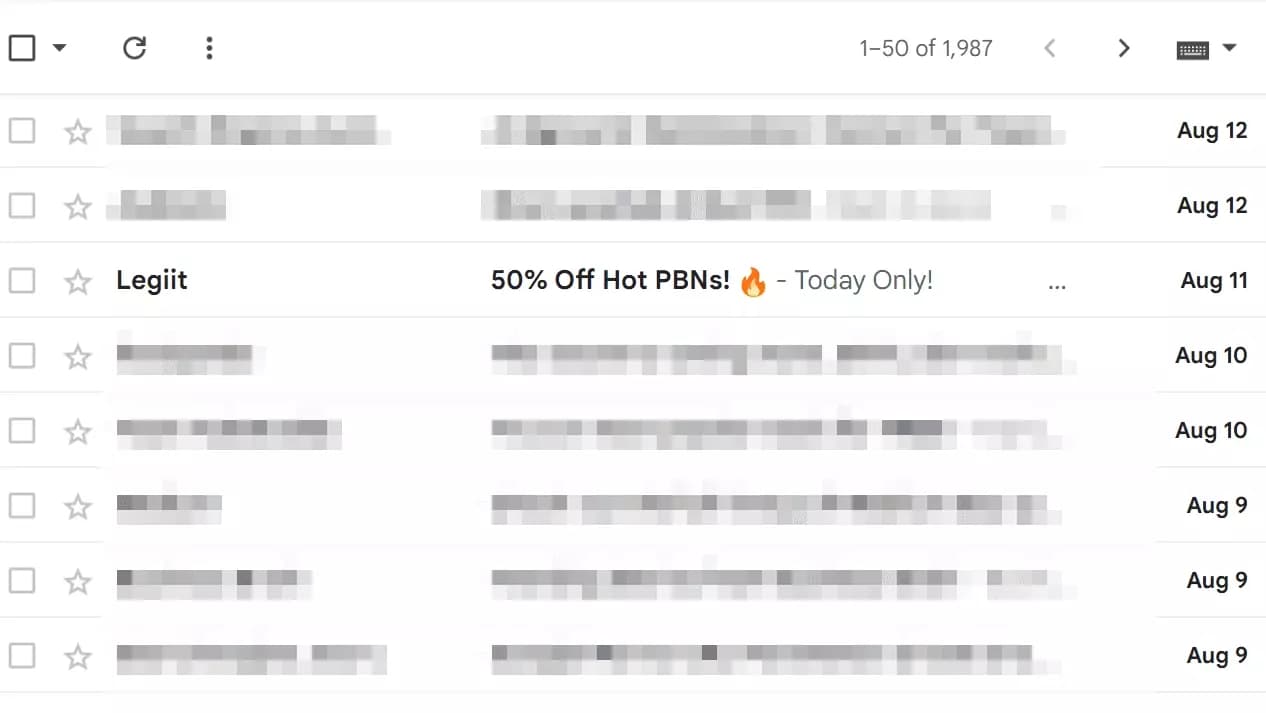
It’s useful when you want to create a sense of urgency in your cold email subject line and make your offer irresistible.
How to implement 4U in subject lines?
- Urgency: Create a sense of urgency to prompt immediate action
- Usefulness: Highlight how the email will benefit the recipient
- Uniqueness: Ensure your subject line stands out from the competition
- Ultra-Specificity: Be very specific about what the recipient will gain
Example: Today Only: Get 50% Off Our Unique Lead Generation Toolf
4. BAB formula
BAB stands for Before, After, Bridge. It's a commonly used storytelling technique in success stories and testimonial-style copies.
BAB basically presents the reader’s current situation (before), shows the improved situation (after), and then positions your solution as the bridge that connects the two.
In subject lines, this formula helps you convey transformation and the value your solution provides.
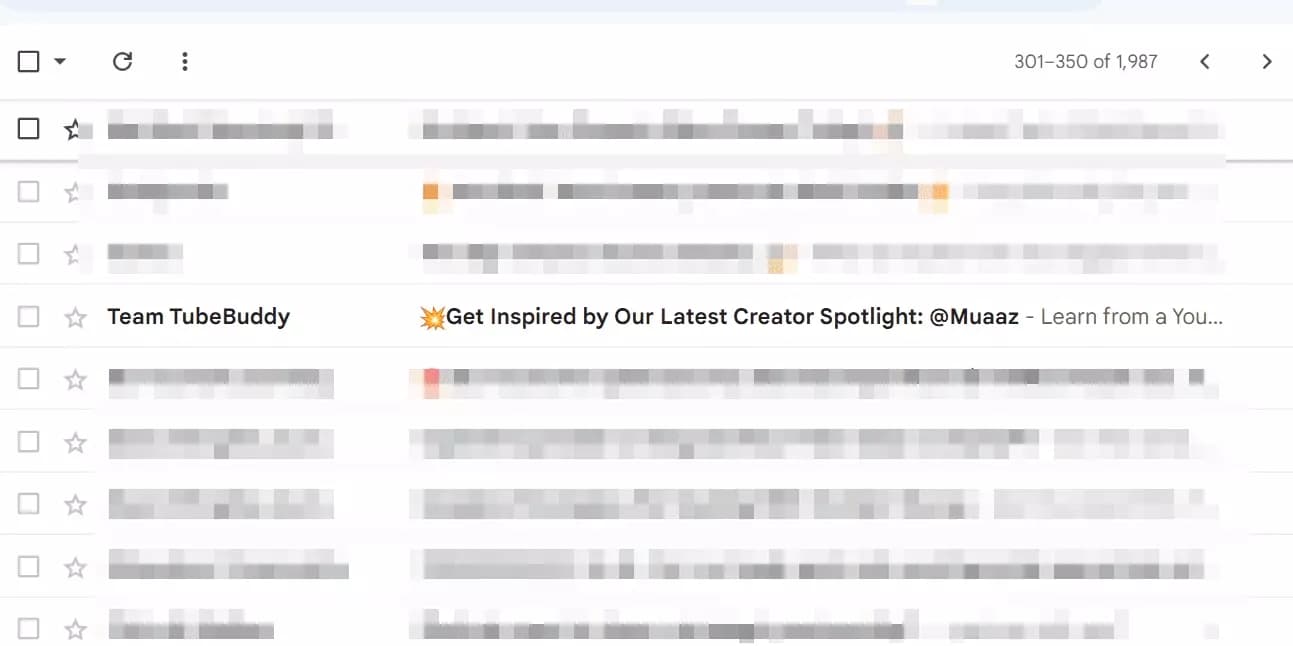
It's an ideal framework if you want to emphasize the transformation your product or service can bring.
You can use this format in your personalized cold emails, not only highlighting your prospect’s problem but also telling him a related success story.
How to implement BAB in subject lines?
- Before: Highlight the current problem or challenge
- After: Show the outcome or improvement
- Bridge: Introduce your solution as the way to achieve that outcome
Example: Struggling with Low Sales? See How We Doubled Revenue in 3 Monthsf
But what if I’m not a good copywriter?
It’s still a little difficult to write subject lines even with principles and formulas. How about a few examples?
100+ Best Cold Email Subject Lines
I felt “few examples” is not enough. One should always have a handful of choices. So we’re going to see 100+ cold email subject line examples.
But it’s everywhere right? Every other article online has this huge list of best subject lines.
What’s different in my list?
Well nobody explains what type of subject lines work in what type of email campaigns. That’s why this list is divided into 10 categories.
- Personalized subject lines
- Question based subject lines
- Direct benefit subject lines
- Curiosity driven subject lines
- Urgent or time sensitive subject lines
- Humorous or playful subject lines
- Social proof or case study subject lines
- Creative and unique subject lines
- Industry specific subject lines
- FOMO subject lines
We’ll learn when to use these 10 types of best subject lines and see some examples of how to write each type of subject line.
Let’s jump straight into it.
1. Personalized subject lines
Personalized subject lines are incredibly effective because they make the recipient feel recognized and valued.
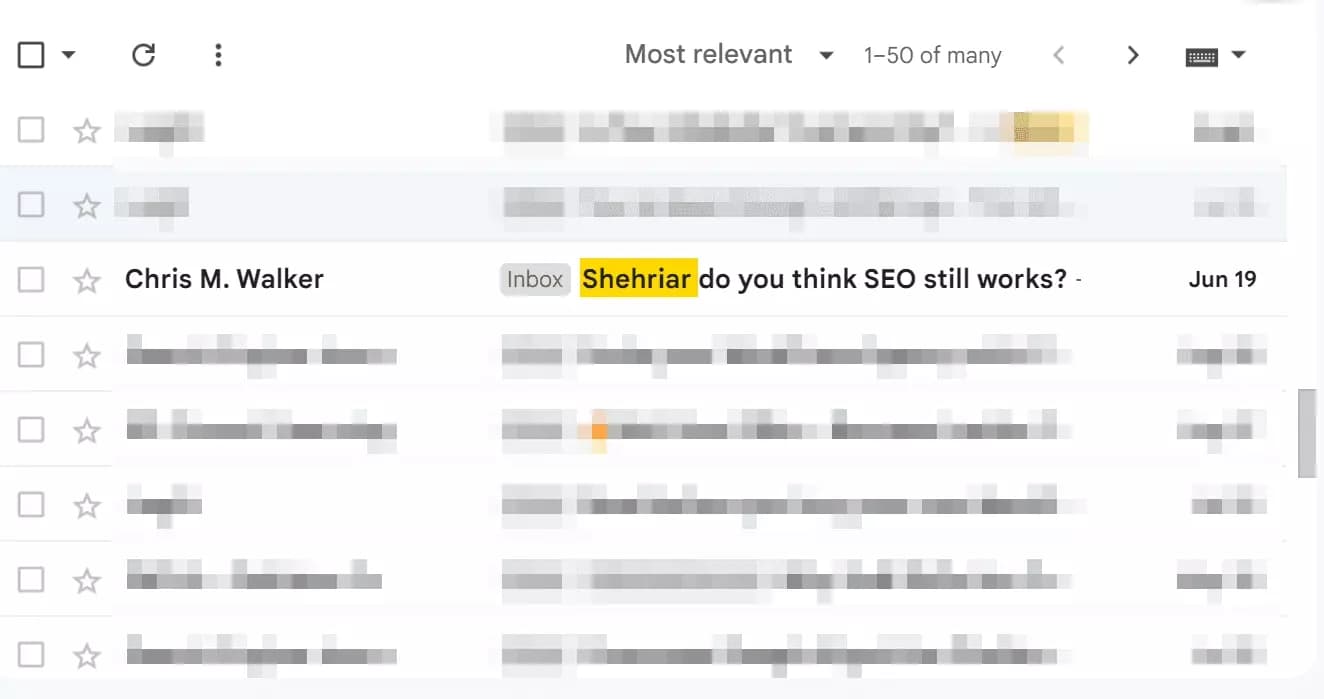
You create a sense of connection and relevance with the recipients by including their name, company, or specific details relevant to them.
But how effective are they?
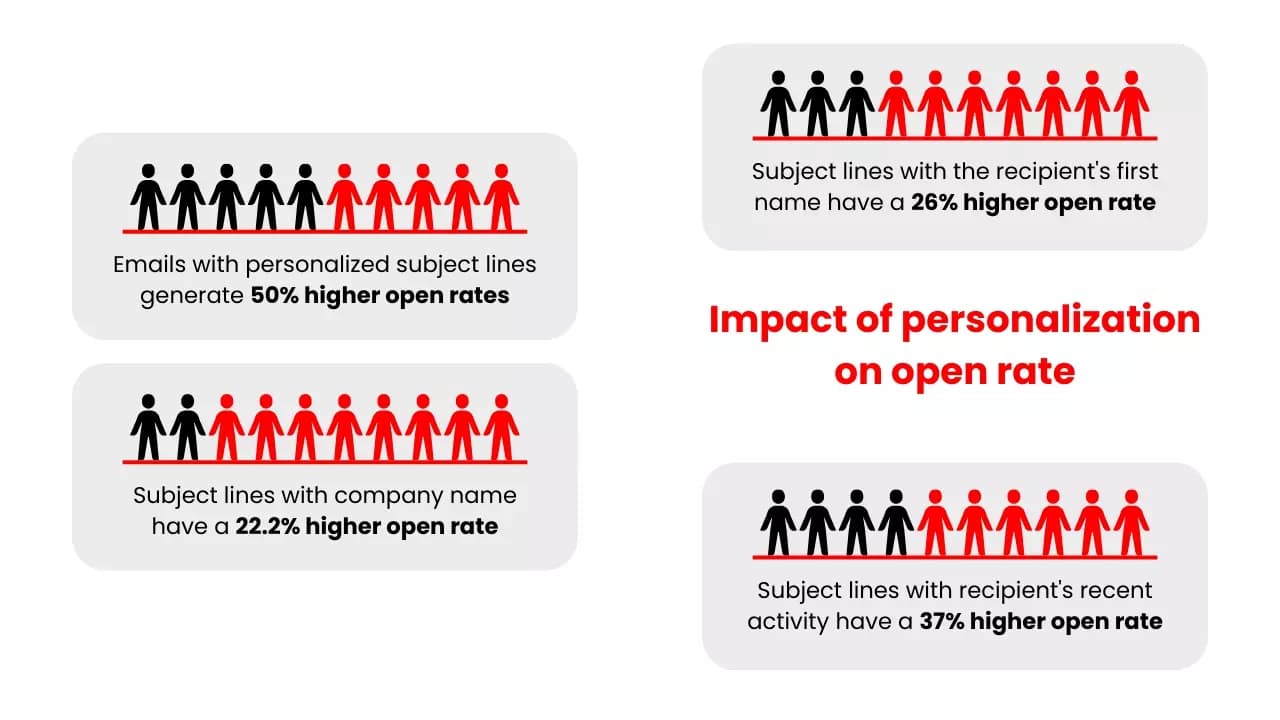
Also subject lines that include the recipient's company name have a 22.2% higher open rate. Mentioning a recipient’s recent activity can boost open rates by 37%.
But when to use this type of subject line?
You can use them when you have specific information about the recipient, such as their name, company, or a recent interaction (obviously 😀).
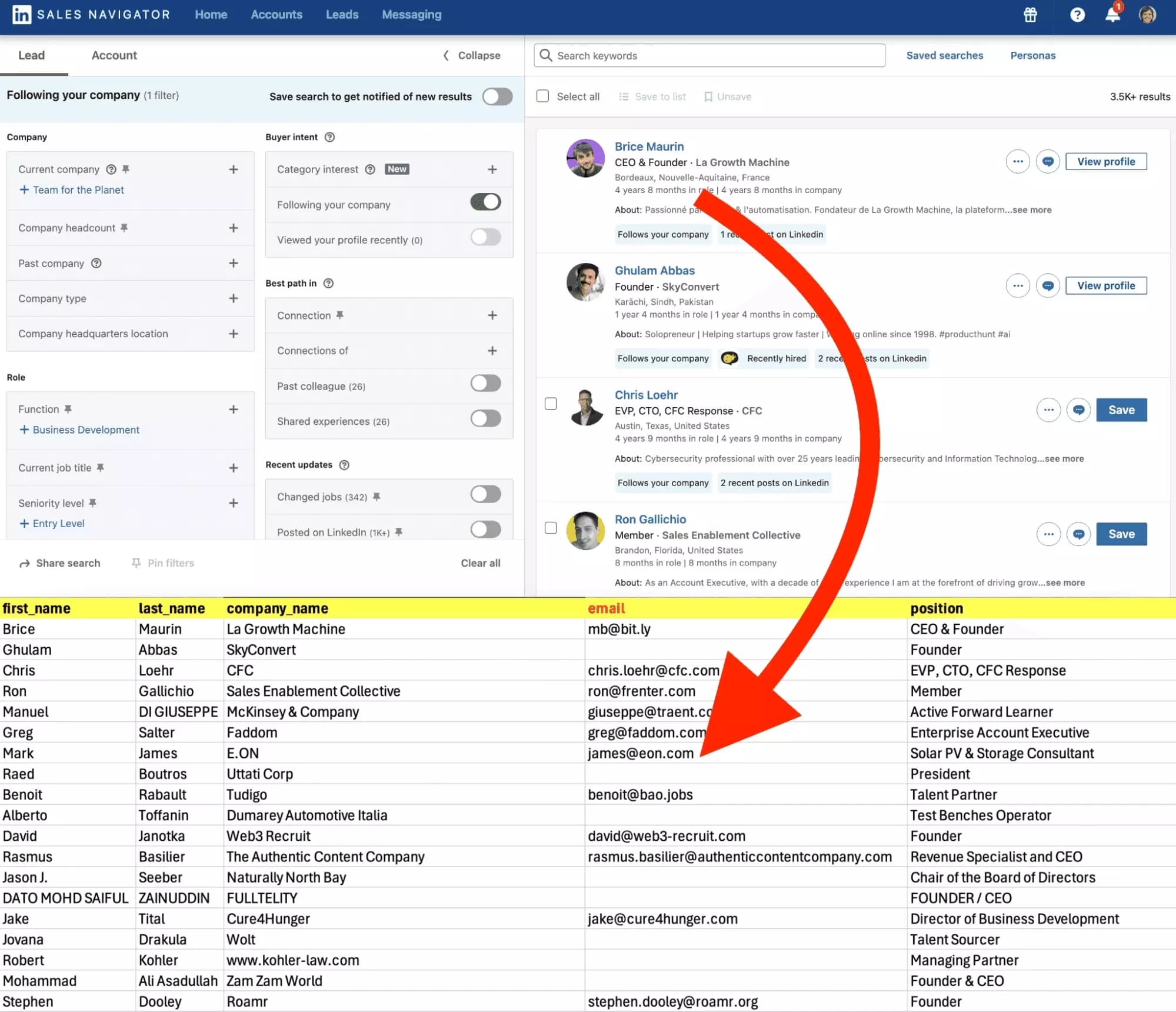
Since Lobstr.io collects first name, last name, and company name along with work emails from Sales Navigator, it’s easy to personalize subject lines using this data.
Now let’s look at some examples of personalized subject lines.
- “[First Name], Here’s a Solution for [Pain Point]”
- “Can We Help [Company Name] Achieve [Specific Goal]?”
- “[First Name], Are You Ready to Take Your [Product/Service] to the Next Level?”
- “Special Offer Just for You, [First Name]”
- “How [Company Name] Can Save Time and Money with Our Solution”
- “[First Name], Let’s Discuss Your [Specific Need]”
- “A Quick Idea for [Company Name]”
- “Exclusive Opportunity for [First Name] at [Company Name]”
- “[First Name], Let’s Get Started on [Project/Goal]”
- “How [Company Name] Can Benefit from [Your Product/Service]”
2. Question based subject lines
Questions naturally invite answers, making the recipient more likely to open the email to see if their curiosity is satisfied.
By posing a question in the subject line, you tap into the recipient’s natural curiosity and encourage them to open the email to find the answer.
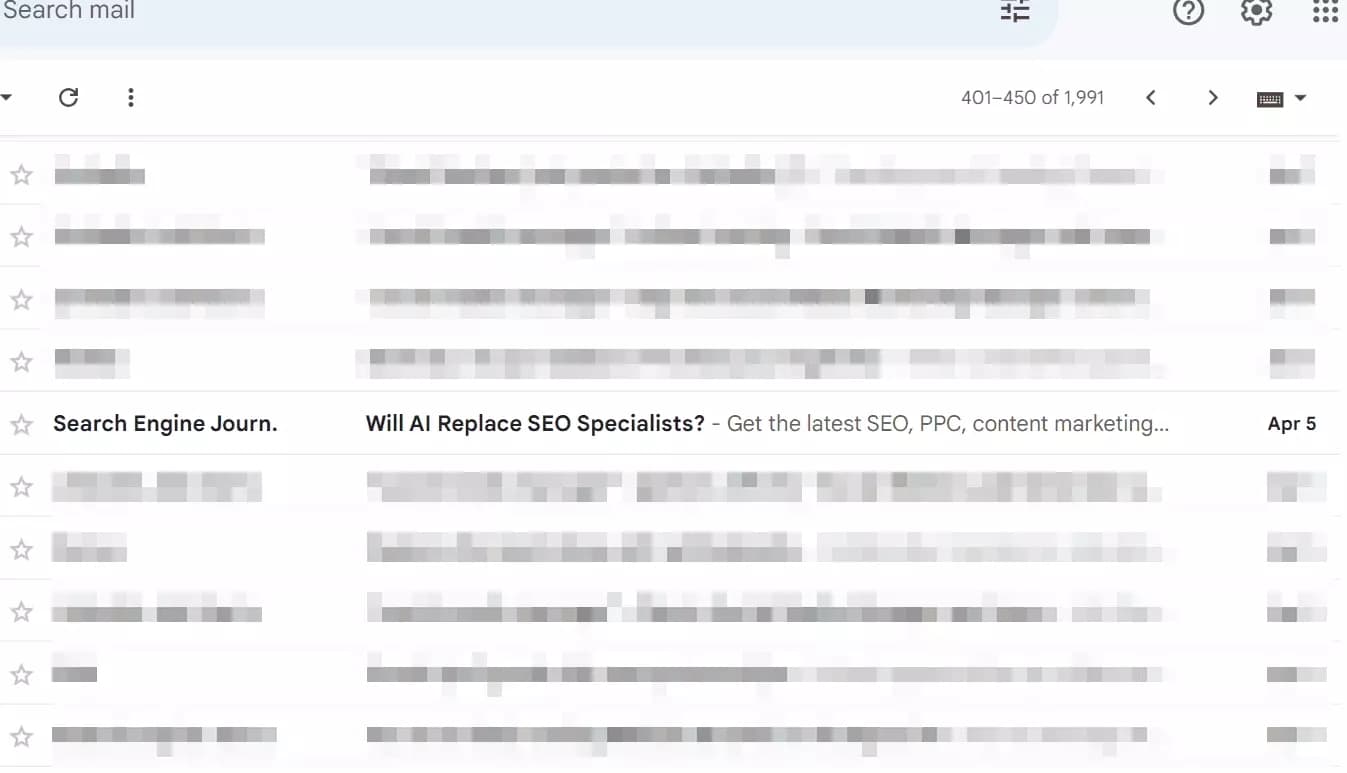
You can use question-based subject lines to prompt the recipient to think about their needs or challenges, or when you want to encourage them to explore a solution.
Here are some sample subject lines to try:
- “Can We Help You Solve [Specific Problem]?”
- “What’s Your Plan for Boosting [Metric] at [Company Name]?”
- “Struggling with [Common Pain Point]? Here’s a Quick Fix”
- “Have You Considered This Strategy for [Goal]?”
- “What’s Holding You Back from Achieving [Specific Outcome]?”
- “Curious About How to Improve [Aspect of Business]?”
- “Are You Making These Mistakes in [Industry/Field]?”
- “Looking for a Better Way to [Achieve Specific Goal]?”
- “What If You Could Solve [Problem] in Just One Step?”
- “Is Your [Product/Service] Delivering the Results You Want?”
3. Direct benefit subject lines
Direct benefit subject lines are straightforward and clearly communicate the value the recipient will gain by opening the email.
These subject lines work well because they immediately answer the recipient's unspoken question – "what’s in it for me?"
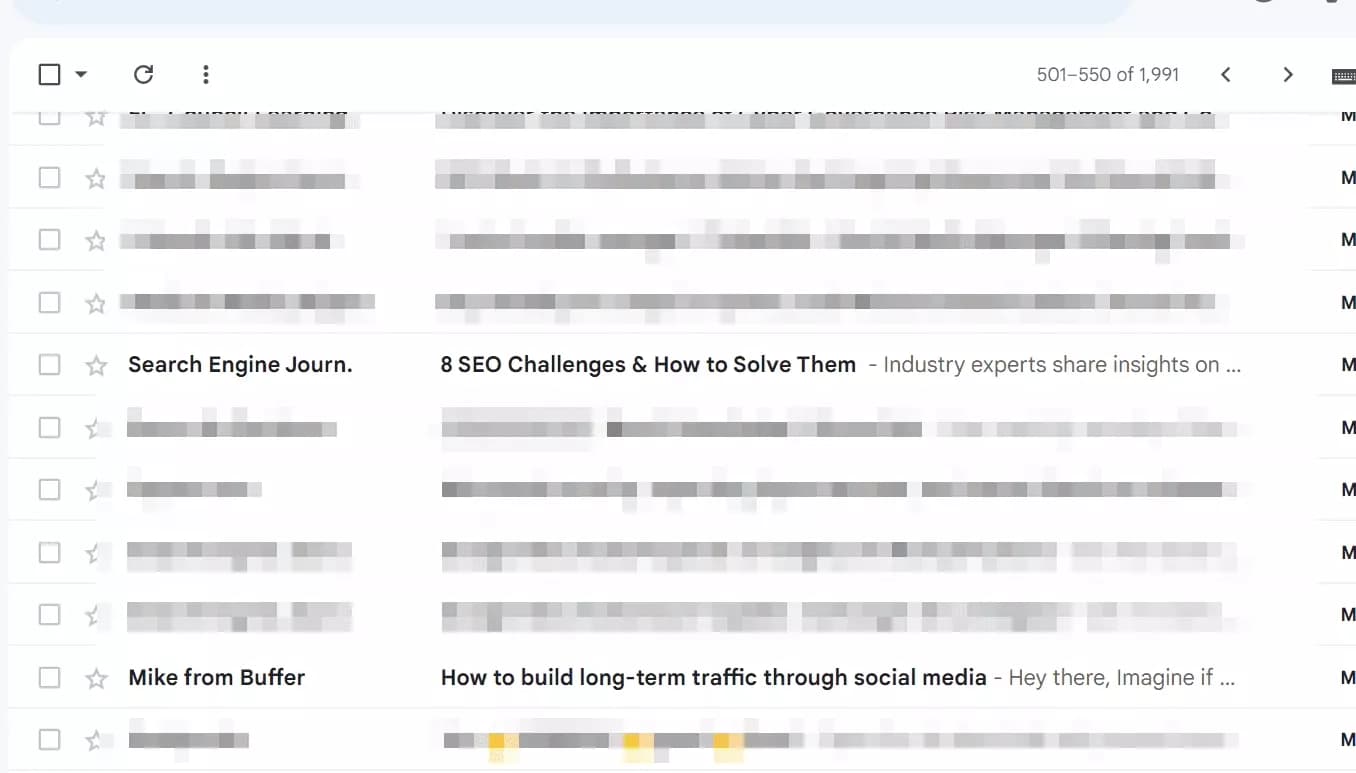
This approach works particularly well in busy inboxes where recipients are scanning for emails that offer immediate value.
Let’s see some examples of direct benefit subject lines.
- “Boost [Company Name]’s Sales by 30% with Our Proven Strategy”
- “Cut Costs by 20%—Here’s How We Helped [Similar Company]”
- “Increase Your Team’s Productivity with This Simple Tool”
- “Unlock Exclusive Savings for [Company Name]”
- “Reduce [Company Name]’s Overhead by 25% with Our Service”
- “Achieve Your Growth Targets Faster with Our Solution”
- “Improve Your [Metric] by 50%—See How We Did It for [Another Company]”
- “Get a Free Consultation to Optimize [Company Name]’s Operations”
- “Maximize Your ROI on [Specific Initiative] with Expert Guidance”
- “Discover How to Streamline [Company Name]’s Workflow Today”
4. Curiosity driven subject lines
These subject lines work by giving just enough information to spark interest without revealing too much.
When you make people curious, they’re more likely to open your email to find out what it’s all about.
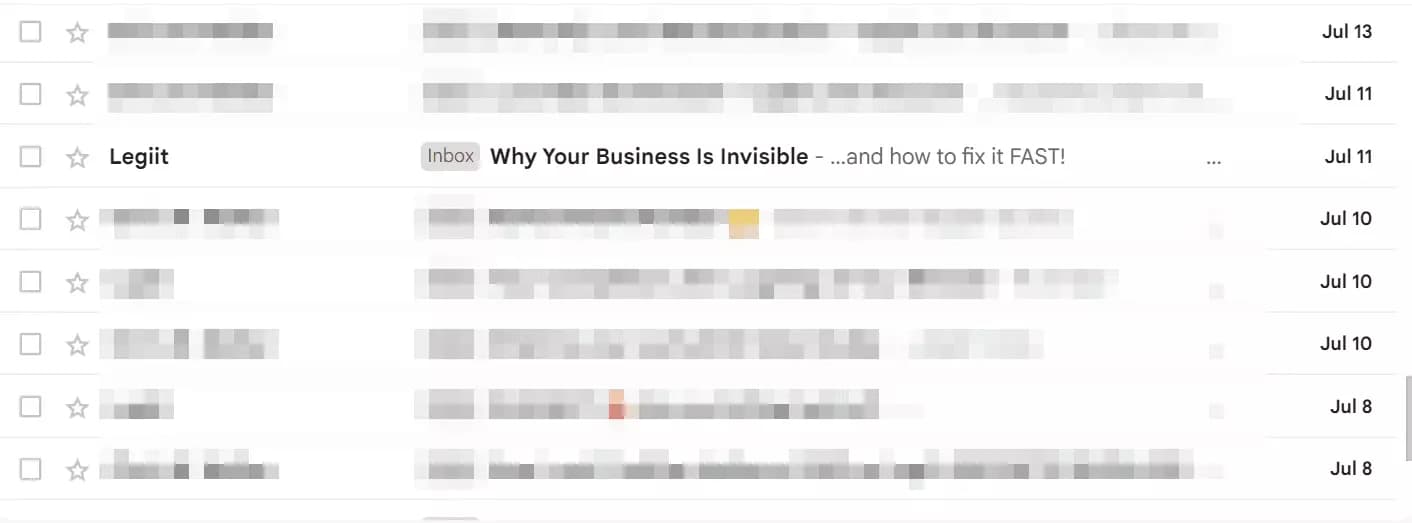
You can use curiosity-driven subject lines to attract readers to explore what’s inside your email.
They work well in newsletters, promotional emails, and any situation where you want to draw the reader in with a hint of what’s to come.
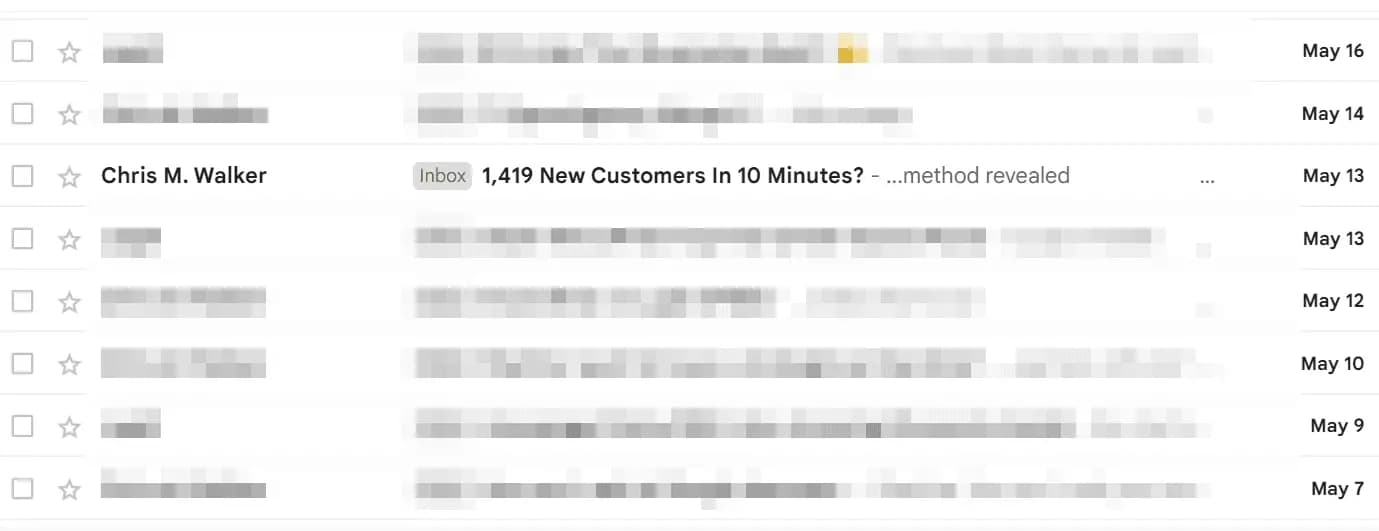
Here are some sample curiosity-driven subject lines:
- “What’s the Secret to [Achieving Specific Goal]?”
- “The Strategy [Successful Company] Uses That You Haven’t Tried Yet”
- “What If [Company Name] Could Double Its Productivity?”
- “You’ll Be Surprised by This [Industry Insight]”
- “Ever Wondered How [Competitor’s Name] Is Outpacing the Market?”
- “The One Tactic [Company Name] Might Be Missing Out On”
- “Discover What [Similar Company] Did to Increase Efficiency”
- “The Hidden Opportunity in [Industry Trend] You Should Know About”
- “This Simple Change Could Transform [Company Name]’s Results”
- “Curious About How [Successful Company] Achieved [Specific Result]?”
5. Urgent or time sensitive subject lines
These subject lines prompt recipients to act quickly by highlighting limited-time offers, upcoming deadlines, or fast-approaching events.
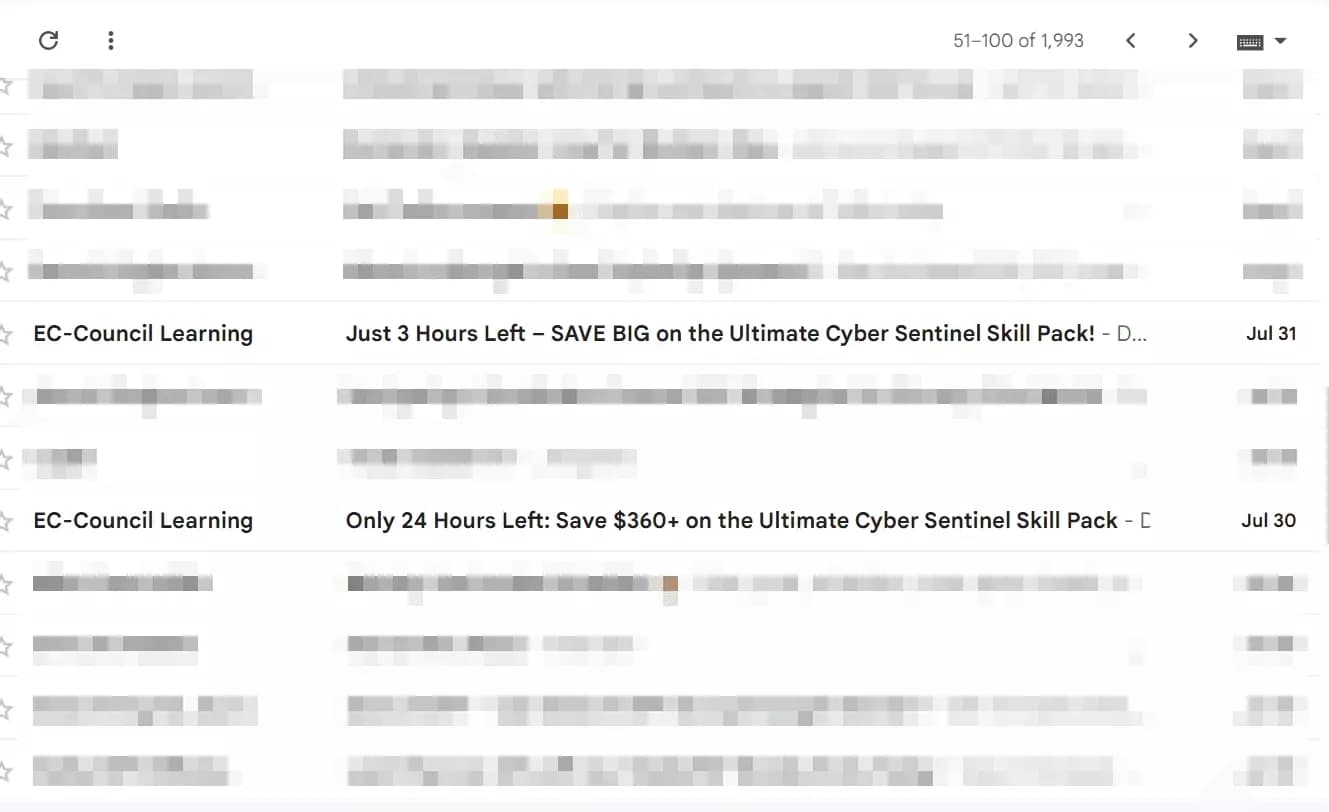
Use urgent or time-sensitive subject lines when you want to drive immediate action.
They are particularly effective in sales emails, event reminders, and any situation requiring a quick response.

Example subject lines:
- “Last Chance: Boost [Company Name]’s Revenue by 20% This Quarter”
- “Only a Few Spots Left for Our Exclusive [Industry] Webinar”
- “Urgent: Limited-Time Offer to Reduce [Company Name]’s Costs”
- “Act Now: [Company Name] Could Miss Out on This Opportunity”
- “Hurry—Discount on [Service/Product] Ends Tomorrow”
- “Final Call: Secure Your Spot for [Event Name] Today”
- “Time’s Running Out: Improve [Metric] Before Month-End”
- “Only 24 Hours Left to Take Advantage of This Offer”
- “Don’t Miss Out: Last Day to Optimize [Specific Process]”
- “Limited Availability: Schedule Your Free Consultation Now”
6. Humorous or playful subject lines
These subject lines use wit and lightheartedness to grab attention and stand out in a crowded inbox.
Playful subject lines make your email feel more approachable and fun, which can help build a positive connection with the recipient.
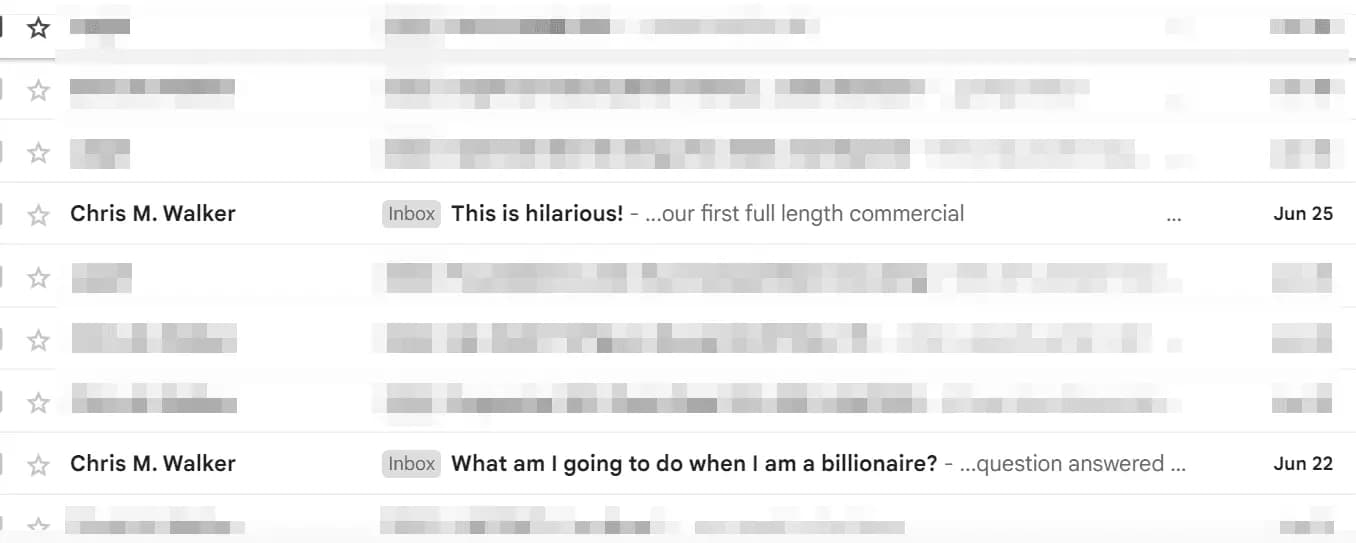
When done right, humor can make your email memorable and increase the likelihood of it being opened.
But what’s bad humor?
Simple. Don’t offend your recipient and stay away from cringe.
For example; "Did you just fart? Because you blew me away with your business acumen!"
It’s extremely cringey and inappropriate, likely to leave the recipient bewildered or offended.
So if you want to use humor, make sure it’s good humor and not cringe. A smart, playful and positive subject line can do wonders for you.
A clever joke or playful wordplay can make your email stand out, encouraging recipients to open it to see what you have to say.
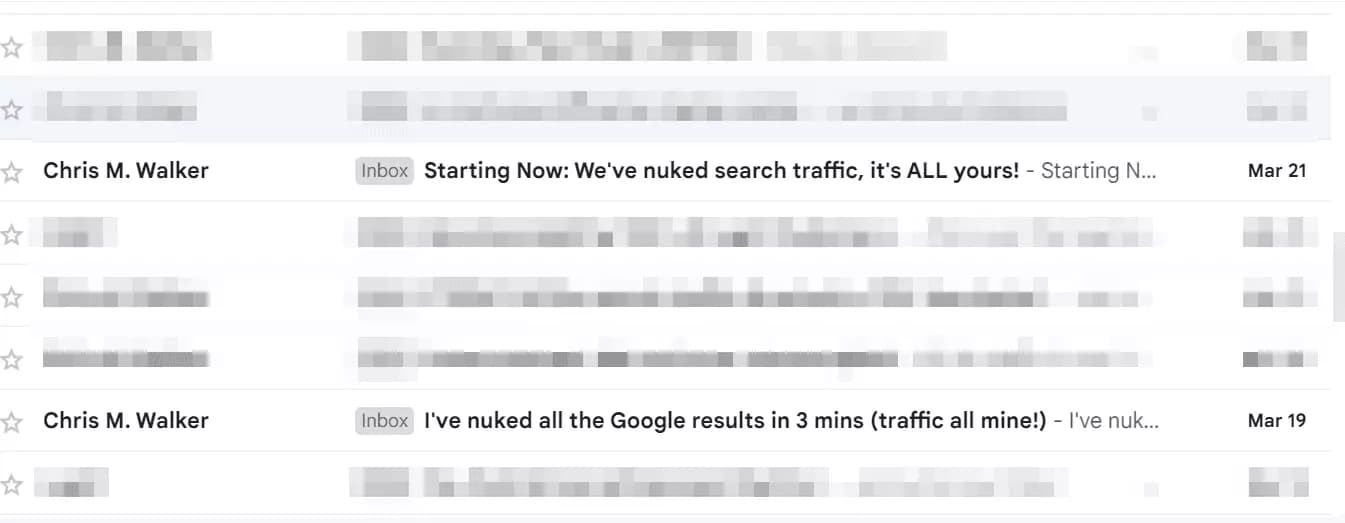
Humor works because it breaks the monotony of serious or overly formal emails. You can use humor to create a casual, friendly tone and make your email feel less formal.
Here are some example subject lines:
- “Is It Too Soon to Call This a Match Made in Heaven?”
- “If You Open This, We Might Just Be BFFs”
- “Are You a Robot? Prove You’re Human by Opening This”
- “This is Another Boring Sales Email”
- “How Many Marketers Does It Take to Open an Email? Just One—You!”
- “This Email Isn’t Life-Changing, But It’s Pretty Close”
- “Spoiler Alert: We Have a Great Offer Inside”
- “Not a Human—Just a Robot with a Great Idea for You”
- “Guess What? You’re About to Discover Something Awesome”
- “Don’t Open This Email…Unless You Love Good Ideas”
- “Free elephant with every purchase!!”
- “This is NOT spam”
7. Social proof or case study subject lines
Social proof means highlighting testimonials, case studies, and success stories. They build trust by showing that your solution works.
When people see how others have benefited from your product or service, they’re more likely to open your email.
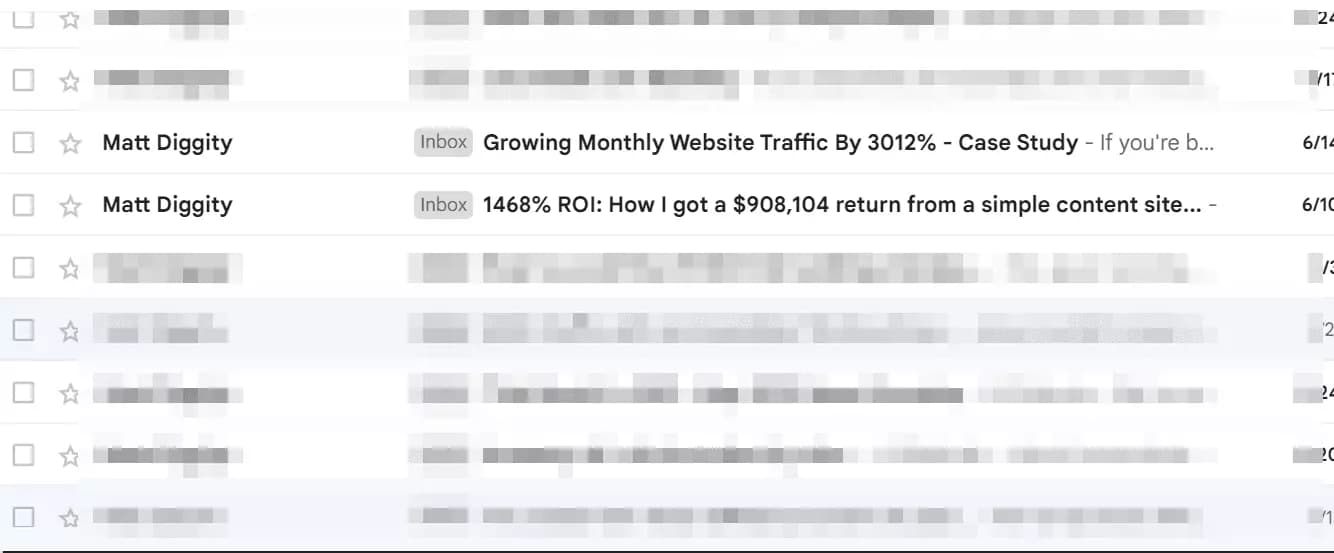
These subject lines work well in cold emails where you need to build credibility quickly, such as in B2B sales, consulting, or technology.
Example subject lines:
- “See How [Company] Boosted ROI by 40%”
- “Why [Company] Chose Us for [Service]”
- “How [Client] Increased Sales by 30%”
- “Join 500+ Companies Using Our [Product]”
- “Learn How [Company] Cut Costs by 25%”
- “How We Helped [Company] Achieve Success”
- “Why [Competitor] Switched to Us”
- “The Secret Behind [Company]’s Success”
- “Hear What [Client] Says About Us”
- “How We Transformed [Company] in 3 Months”
8. Creative and unique subject lines
Creative subject lines stand out in a crowded inbox by being different from the usual. They’re unexpected and catchy.
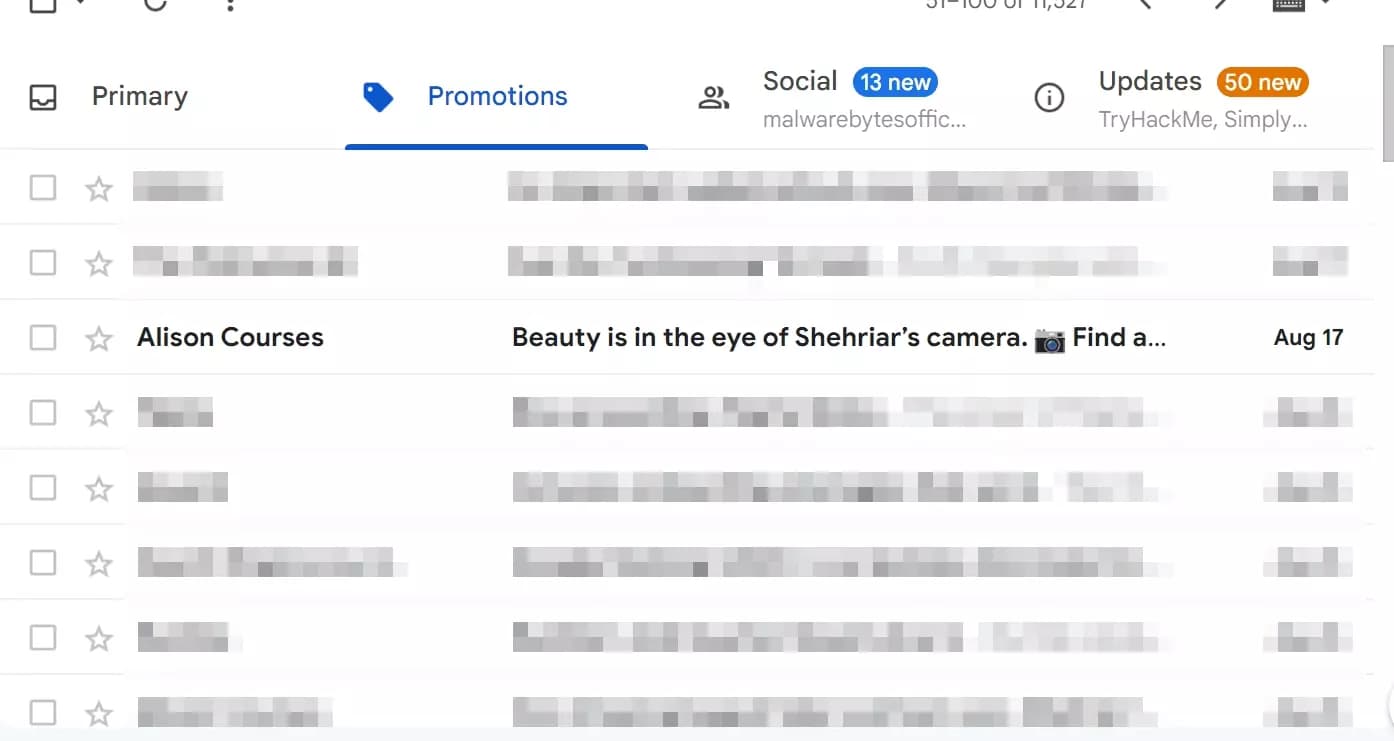
They work well in cold emails where you need to grab attention quickly and stand out from the typical sales or marketing emails.
But how to make your subject lines creative?
Here are some examples:
- “Old-School Tactics, New Wins for [Company Name]”
- “Think Back to Your First Win—Here’s How to Do It Again”
- “The Secret to Winning? Sometimes It’s Going Retro”
- “Curious About a Timeless Strategy? Let’s Talk”
- “Bringing Back the Basics—And Winning Big”
- “A Fresh Idea Rooted in What’s Always Worked”
- “A Classic Strategy That Still Delivers Results Today”
- “This Throwback Idea Could Give [Company Name] a Big Win”
- “Winning Strategies from the Past, Tailored for Today”
- “A Fresh Win for [Company Name]—Inspired by the Past”
9. Industry specific subject lines
Industry-specific subject lines address the unique challenges and opportunities within a particular field.
By tailoring your subject lines to the recipient’s industry, you show them that you understand their needs and offer relevant solutions.
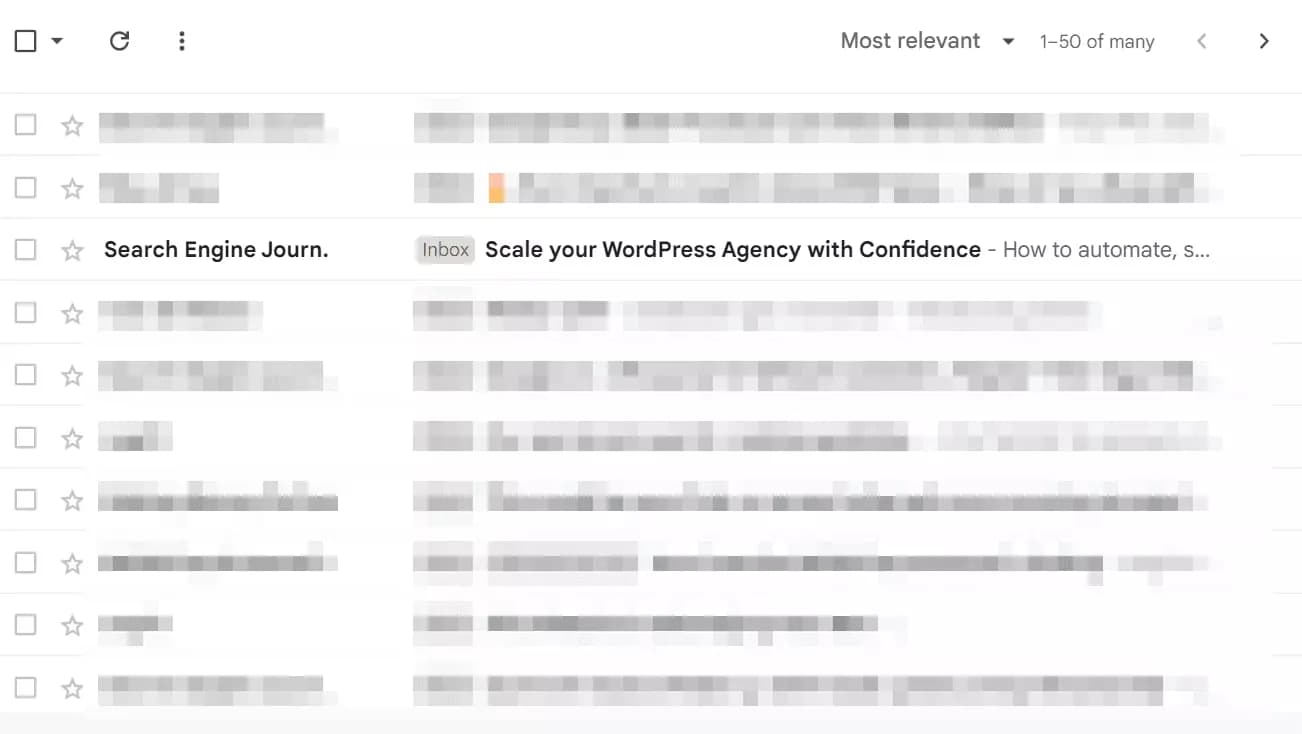
You can also tailor your subject lines to specific job roles, targeting marketers, salespeople, HR professionals, and more.
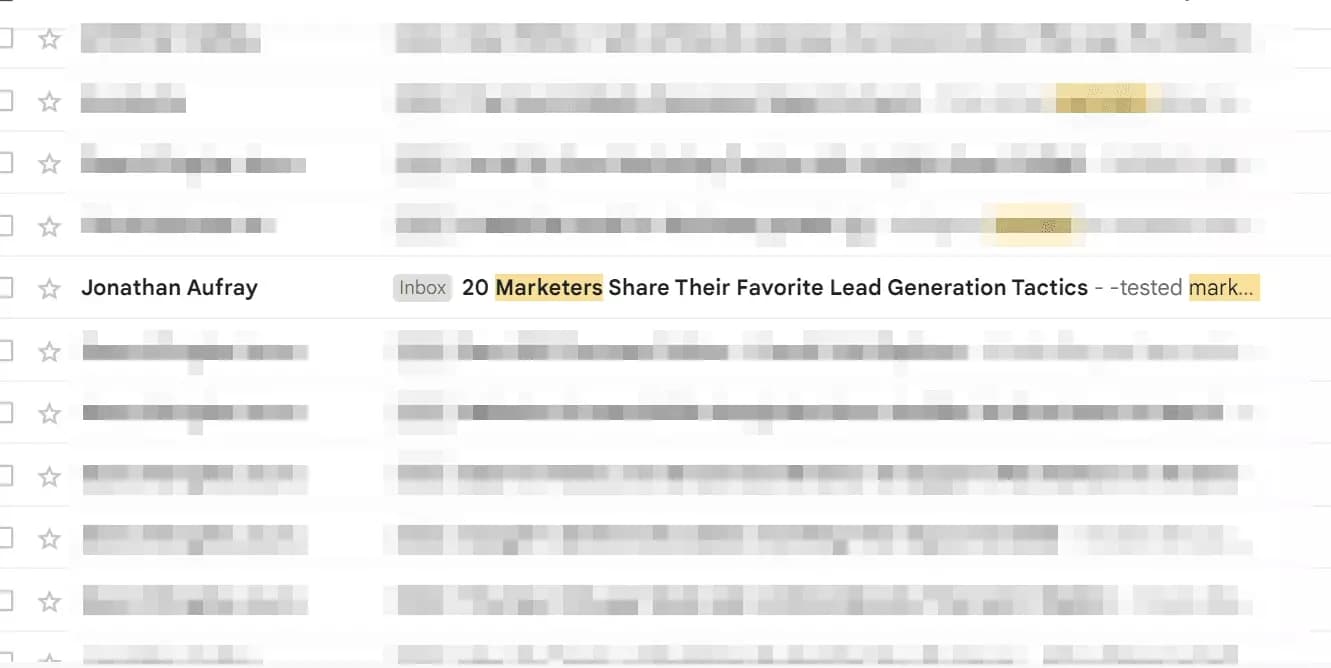
Industry-specific subject lines work because they resonate with the recipient’s specific challenges and interests.
This approach works well in cold emails, especially in sectors like technology, finance, or healthcare.
Here are some examples:
- “How Top Marketers in [Industry] Are Boosting ROI in 2024”
- “Strategies for HR Leaders in [Industry]—Improve Retention Now”
- “What [Job Title]s in [Industry] Need to Know About [Trend/Challenge]”
- “Cut Costs and Increase Efficiency—A Must for [Industry] Operations Managers”
- “Why [Industry] CFOs Are Turning to [Your Solution]”
- “The Latest in [Industry] Compliance—For Legal Experts Like You”
- “How [Industry] Sales Teams Are Closing More Deals with [Your Product]”
- “Tech Innovators in Ahead with These Tools”
- “What Every [Job Title] in [Industry] Should Know About [New Regulation/Trend]”
- “How [Industry] Leaders in [Job Title] Are Preparing for 2024”
10. FOMO subject lines
FOMO, or the Fear of Missing Out, is a powerful psychological trigger that can drive people to take action quickly.
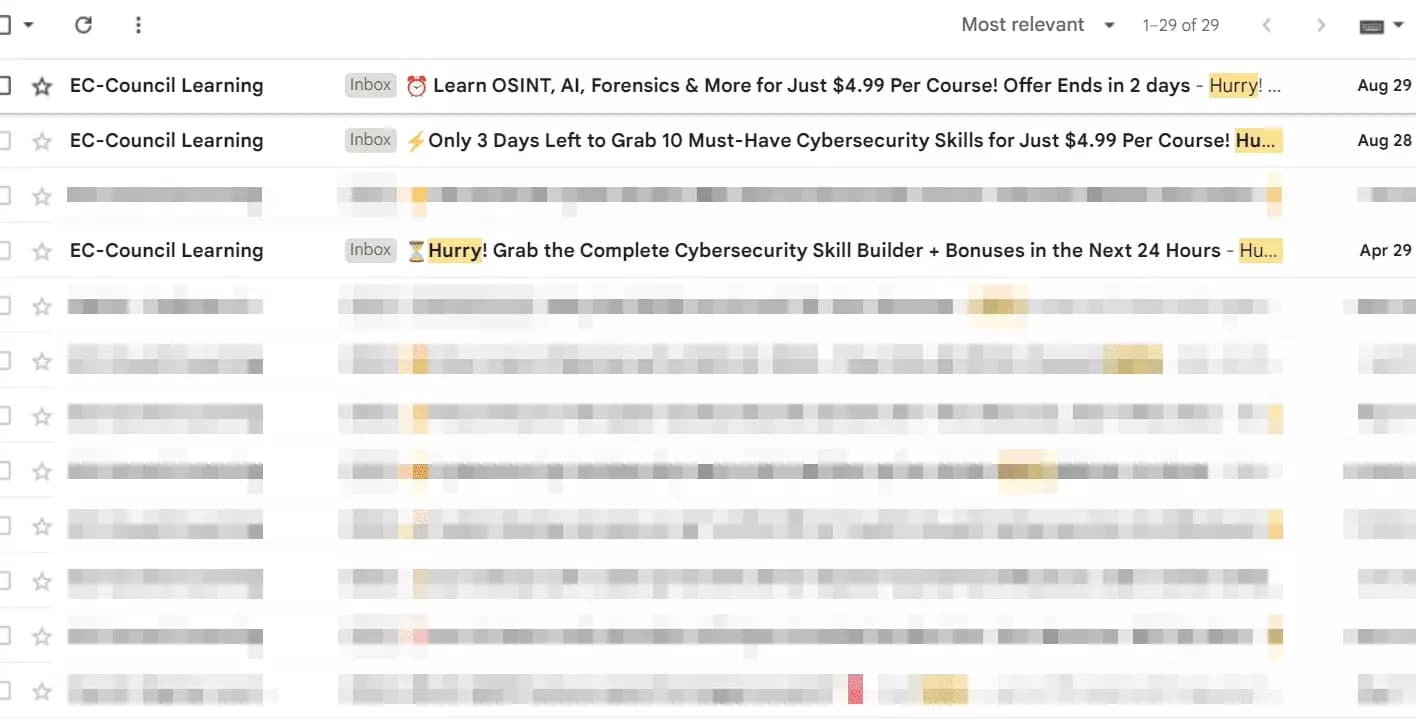
FOMO-based subject lines create a sense of urgency and exclusivity, making people feel like they might miss out on something valuable if they don’t open the email right away.
FOMO subject lines are actually a mixture of urgency and exclusivity.
And I've already discussed how urgency impacts the open rate.
Here are some examples of FOMO subject lines:
- “Don’t Miss Out on a Game-Changing Opportunity for [Company Name]”
- “Only a Few Seats Left—Grab Yours Now!”
- “Last Call: Exclusive Offer Ending Soon”
- “Limited Availability—Act Now Before It’s Gone”
- “This Chance Won’t Come Again—Secure Your Spot Today”
- “You’re About to Miss Out—Open This Before It’s Too Late”
- “Final Hours: Don’t Miss Your Chance to Benefit from [Offer]”
- “Last Opportunity to Get Ahead—Don’t Let It Slip Away”
- “This Offer Is Almost Gone—Claim It While You Can”
- “Exclusive Deal Ending Soon—Act Before It’s Too Late”
So these were 100+ cold email subject lines you can use in your cold outreach campaigns.
But what about follow-ups?
EXTRA: Best cold email follow-up subject lines
Follow-up email subject lines are crucial for keeping the conversation going.
By sending follow-ups, you remind recipients of your previous message and prompt them to engage.
That's why an attractive and catchy follow-up subject line can significantly increase your chances of getting a response.
Follow-up emails are vital in cold outreach, where the initial email might not get a reply.
Example follow-up subject lines:
- “Just Checking In—Did You See My Last Email?”
- “Quick Reminder: Can We Connect About [Topic]?”
- “Any Thoughts on My Previous Email?”
- “Following Up—Are You Interested in [Offer]?”
- “Can We Chat About [Topic]?”
- “Still Interested in [Benefit]? Let’s Talk”
- “Did My Last Email Get Lost?”
- “Quick Follow-Up on My Last Message”
- “Any Questions About [Product/Service]?”
- “Final Follow-Up—Is Now a Good Time to Connect?”
OK so these were 100+ subject lines that you can use or get inspiration from.
Now let’s explore some interesting elements you can use to create attention-grabbing subject lines.
Using emojis and numbers in cold email subject lines
Using emojis and numbers in your cold email subject lines can make your emails stand out and catch the recipient’s eye in a crowded inbox.
Emojis add a visual touch to your subject lines, making them more engaging and relatable.
They can convey emotion or tone, helping to set the mood for your message.
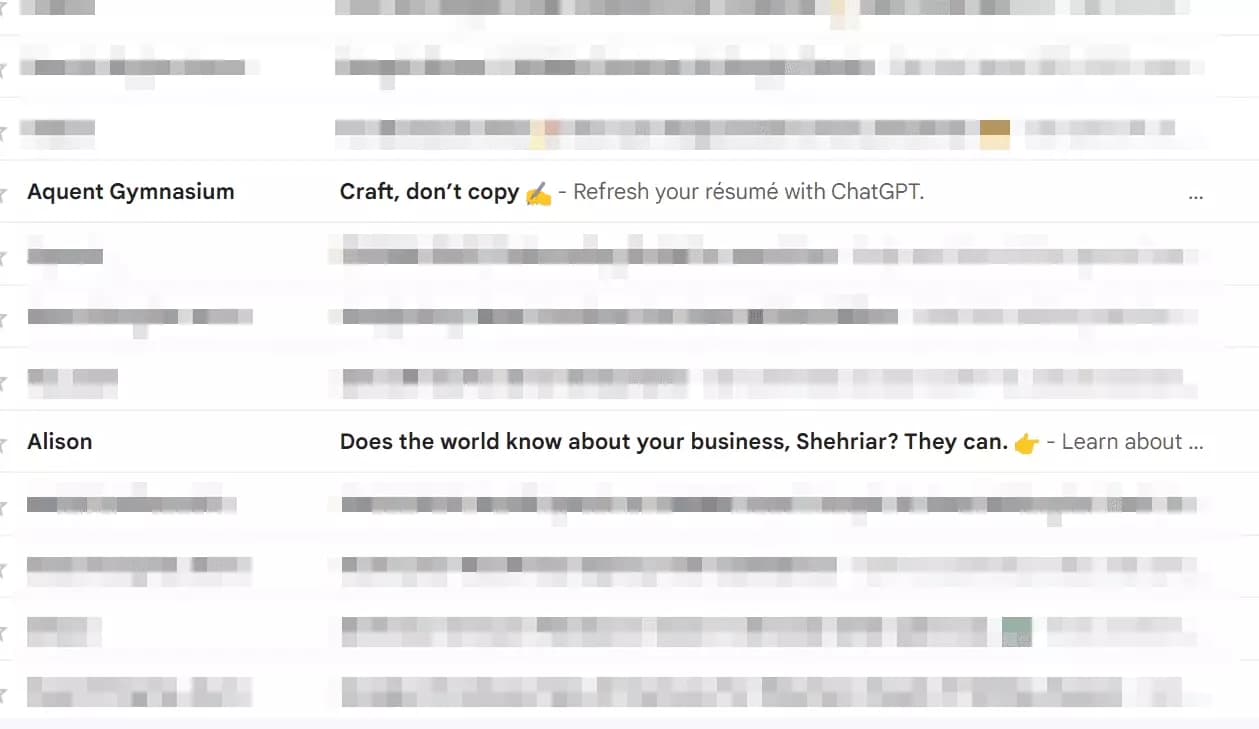
The same goes for numbers too.
Numbers provide clarity and specificity. They quickly communicate the value or urgency of your message.
But how do I use them in my subject lines?
Here are a few tips to use numbers and emojis effectively in subject lines.
- Stick to one or two emojis to grab attention without cluttering the subject line
- Choose an emoji that matches your email’s content, like a calendar 📅 for events
- Use numbers to emphasize key points, like Save 20% Today or 3 Quick Tips
- Specific numbers, like Increase Sales by 25%, work better than vague ones
- A/B test different emojis and numbers to see what gets the best results
Great. Now we know using emojis and numbers can increase open rate.
But are there any words that can boost open rate?
Yes, they are called power words.
Using power words in cold email subject lines
Power words are persuasive, emotional, and action-oriented words that make your subject lines more effective.
These words trigger strong psychological responses like urgency, curiosity, excitement, or a sense of value.
- Subject lines with the word exclusive have a 14% higher open rate
- Email subject lines with the word free have a 10% higher open rate
- Emails with the word Alert in the subject line have a 61.8% higher open rate
- Subject lines with time-sensitive words like today or urgent have a 22% higher open rate
- Subject lines with the word quick have a 12% higher open rate
- Including the word video in an email’s subject line raises open rates by 7 to 13%.
- Words like wonderful, content, go, just, and upgrade are top performers in subject lines.
- Subject lines with the word newsletter see an 18.7% lower open rate.
- Subject lines with the word “Fw: are opened 17% less often than those without it.
Let me give you a list of power words categorized by the type of response they trigger.
| Urgency | Value | Emotion | Action | Curiosity | Trust |
|---|---|---|---|---|---|
| Hurry | Free | Love | Discover | Hidden | Secure |
| Last Chance | Exclusive | Secret | Unlock | Surprising | Certified |
| Now | Best | Inspiring | Boost | Lesser-Known | Guaranteed |
| Limited | Proven | Powerful | Achieve | Unveiled | Verified |
| Act Fast | Discount | Exciting | Improve | Mystery | Risk-Free |
| Urgent | Save | Unbeatable | Get | Untold | Safe |
| Deadline | Premium | Join | Unexpected | Backed | |
| Final | Special | Start | Confession | Trusted | |
| Ending Soon | Bonus | Build | Unknown | Authentic | |
| Don’t Miss | Limited-Time | Accelerate |
But the question is – how do I use them effectively in my subject lines?
Tips for using power words in email subject lines
- A/B test different power words to see what works best
- Don’t overload your subject line with too many power words
- Only use power words that match the content of your email
- Choose power words that fit your email's tone
- Make sure your subject line is clear and easy to understand
But sometimes some of these power words actually turn into trigger words and might land your email in the spam folder.
Let’s understand how.
Trigger words that can land your email in SPAM
Even before recipients see your email, spam filters might flag it due to certain trigger words in the subject line.
Spam filters are actually software tools used by email providers to protect users from unwanted emails, including spam and phishing attempts.
These filters look for specific "trigger words" in the subject line or body of your email that are commonly associated with spam.
Here are some common trigger words that might lead to SPAM.
- Free: While enticing, it’s a word often used in spammy contexts
- Win: This word can sound too good to be true, raising red flags
- Limited-Time Offer: Phrases like this can seem overly promotional
- Act Now: Urgent phrases can be seen as pushy or aggressive
- Click Here: Direct commands might be viewed as suspicious
- Congratulations: Often associated with scam emails
- Risk-Free: This phrase can trigger skepticism in spam filters
- Save Big: Phrases promising huge savings are frequently flagged
- 100% Free: Overly promotional phrases like this can be problematic
- Cash Bonus: References to money can be a big red flag for filters
- Guarantee: While reassuring, this word is commonly used in spam
- No Obligation: This phrase might sound too good to be true
But most of them are power words right? 🤔
Let me clarify it.
Why might some power words trigger spam filters?
These words have been overused in spammy emails, which makes spam filters more likely to flag them.
This is especially true if the email’s content doesn’t match the promise made by the subject line.
How to use power words safely?
- Don't over-use power words in your subject line or email copy
- Make sure the power words accurately reflect the email’s content
- Use email testing tools to check for spam triggers in your subject lines
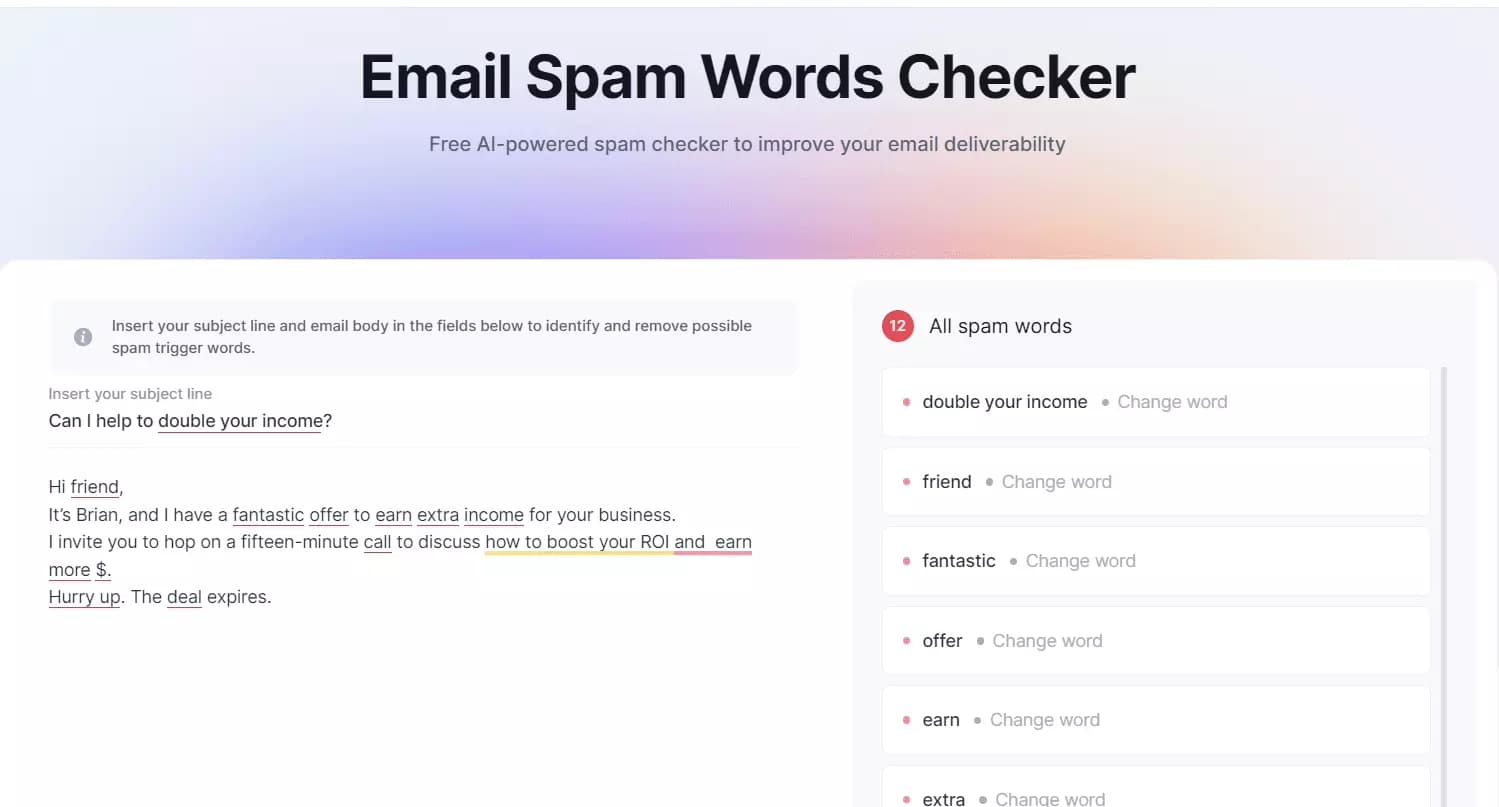
Common mistakes to avoid
Here are a few other mistakes you should avoid while crafting your B2B cold email subject lines.
- Strictly avoid false and spammy clickbait
- Don’t make promises you can’t keep
- Limit punctuation—too many symbols look spammy
- Make sure it looks good on mobile devices
- Always test different subject lines
- Avoid using all caps—it looks like shouting
- Use preview text to add more context
That’s it. Now let’s answer some frequently asked questions before concluding this super long article.
FAQs
How can I improve the deliverability of my cold emails?
To improve deliverability, create high-quality content, keep a clean email list, and avoid using spammy cold email templates.
Using email outreach automation and regularly testing your emails also helps landing in the recipient’s inbox.
What are some tips to write best sales email subject lines?
You can use the same principles, formulas, and tips I covered in this article to write any type of sales email subject lines.
In simple words, follow these tips:
- Keep it short and clear
- Personalize when possible
- Highlight the value or benefit
- Create urgency or curiosity
- Avoid spammy language
- Match the subject line to the content
- Test and optimize
What is a good cold call email subject line?
A good cold call email subject line is short, personalized, and clear. It should grab attention by highlighting a benefit, sparking curiosity, or posing a quick question.
Keep it relevant and direct to encourage the recipient to open the email.
Why are referrals important in email marketing?
Referrals can help grow your email list quickly. Encourage your subscribers to refer friends or colleagues to your service.
Offering incentives like discounts or exclusive content, can also increase engagement and drive more conversions.
